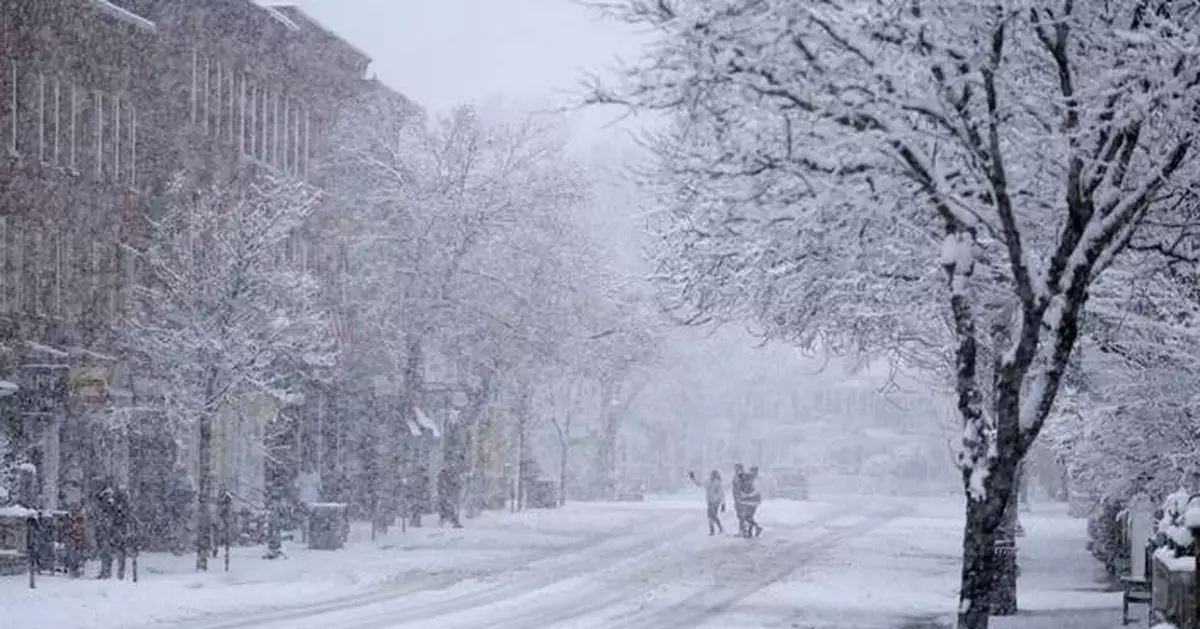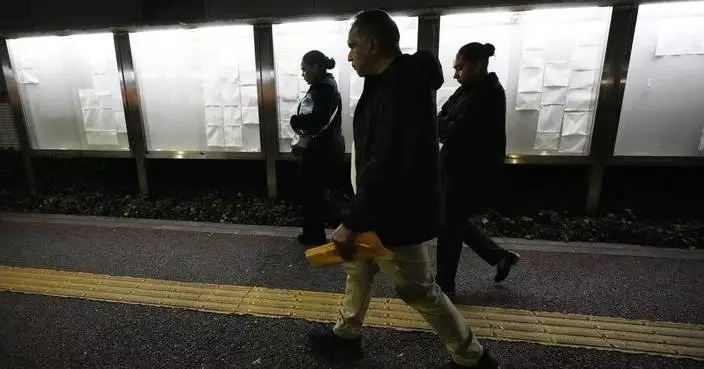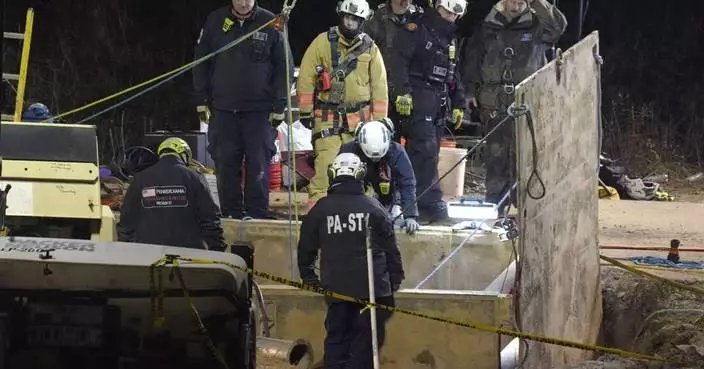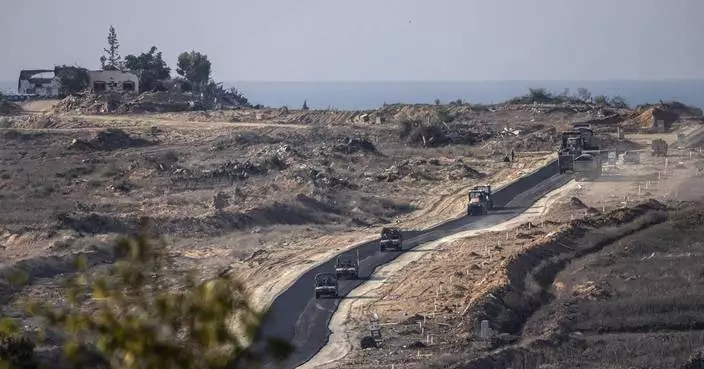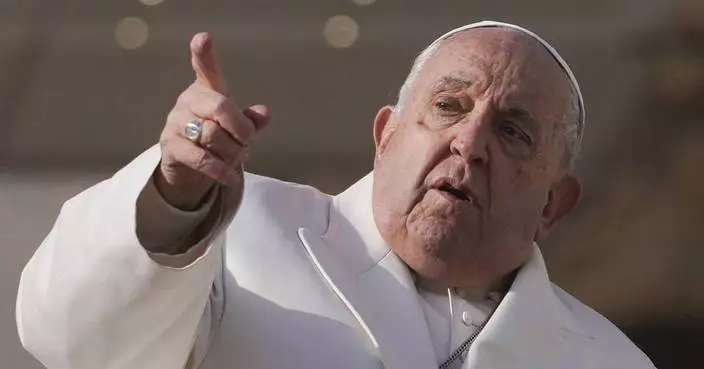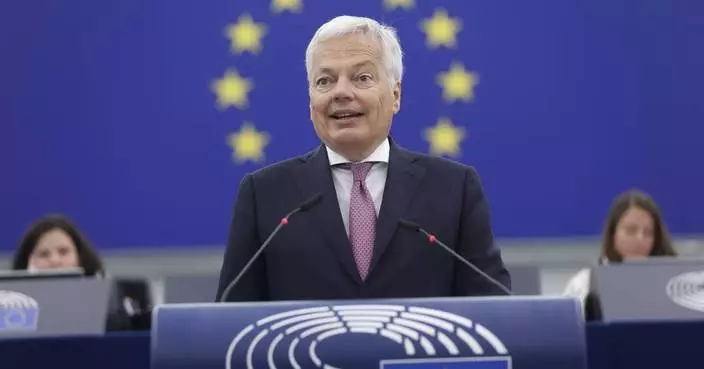Social media users are misrepresenting a Vermont Supreme Court ruling, claiming that it gives schools permission to vaccinate children even if their parents do not consent.
The ruling addressed a lawsuit filed by Dario and Shujen Politella against Windham Southeast School District and state officials over the mistaken vaccination of their child against COVID-19 in 2021, when he was 6 years old. A lower court had dismissed the original complaint, as well as an amended version. An appeal to the U.S. Supreme Court was filed on Nov. 19.
But the ruling by Vermont's high court is not as far-reaching as some online have claimed. In reality, it concluded that anyone protected under the Public Readiness and Emergency Preparedness Act, or PREP, Act is immune to state lawsuits.
Here's a closer look at the facts.
CLAIM: The Vermont Supreme Court ruled that schools can vaccinate children against their parents' wishes.
THE FACTS: The claim stems from a July 26 ruling by the Vermont Supreme Court, which found that anyone protected by the PREP Act is immune to state lawsuits, including the officials named in the Politella's suit. The ruling does not authorize schools to vaccinate children at their discretion.
According to the lawsuit, the Politella's son — referred to as L.P. — was given one dose of the Pfizer BioNTech COVID-19 vaccine at a vaccination clinic held at Academy School in Brattleboro even though his father, Dario, told the school's assistant principal a few days before that his son was not to receive a vaccination. In what officials described as a mistake, L.P. was removed from class and had a “handwritten label” put on his shirt with the name and date of birth of another student, L.K., who had already been vaccinated that day. L.P. was then vaccinated.
Ultimately, the Vermont Supreme Court ruled that officials involved in the case could not be sued.
“We conclude that the PREP Act immunizes every defendant in this case and this fact alone is enough to dismiss the case,” the Vermont Supreme Court's ruling reads. “We conclude that when the federal PREP Act immunizes a defendant, the PREP Act bars all state-law claims against that defendant as a matter of law.”
The PREP Act, enacted by Congress in 2005, authorizes the secretary of the Department of Health and Human Services to issue a declaration in the event of a public health emergency providing immunity from liability for activities related to medical countermeasures, such as the administration of a vaccine, except in cases of “willful misconduct" that result in “death or serious physical injury.” A declaration against COVID-19 was issued on March 17, 2020. It is set to expire on Dec. 31. Federals suits claiming willful misconduct are filed in Washington.
Social media users described the Vermont Supreme Court's ruling as having consequences beyond what it actually says.
“The Vermont Supreme Court has ruled that schools can force-vaccinate children for Covid against the wishes of their parents,” reads one X post that had been liked and shared approximately 16,600 times as of Tuesday. “The high court ruled on a case involving a 6-year-old boy who was forced to take a Covid mRNA injection by his school. However, his family had explicitly stated that they didn't want their child to receive the ‘vaccines.’”
Other users alleged that the ruling gives schools permission to give students any vaccine without parental consent, not just ones for COVID-19.
Rod Smolla, president of the Vermont Law and Graduate School and an expert on constitutional law, told The Associated Press that the ruling “merely holds that the federal statute at issue, the PREP Act, preempts state lawsuits in cases in which officials mistakenly administer a vaccination without consent.”
“Nothing in the Vermont Supreme Court opinion states that school officials can vaccinate a child against the instructions of the parent,” he wrote in an email.
Asked whether the claims spreading online have any merit, Ronald Ferrara, an attorney representing the Politellas, told the AP that although the ruling doesn't say schools can vaccinate students regardless of parental consent, officials could interpret it to mean that they could get away with doing so under the PREP Act, at least when it comes to COVID-19 vaccines. He explained that the U.S. Supreme Court appeal seeks to clarify whether the Vermont Supreme Court interpreted the PREP Act beyond what Congress intended.
“The Politella’s fundamental liberty interest to decide whether their son should receive elective medical treatment was denied by agents of the State and School,” he wrote in an email to the AP. “The Vermont Court misconstrues the scope of PREP Act immunity (which is conditioned upon informed consent for medical treatments unapproved by FDA), to cover this denial of rights and its underlying battery.”
Ferrara added that he was not aware of the claims spreading online, but that he “can understand how lay people may conflate the court's mistaken grant of immunity for misconduct as tantamount to blessing such misconduct.”
John Klar, who also represents the Politellas, went a step further, telling the AP that the Vermont Supreme Court ruling means that “as a matter of law” schools can get away with vaccinating students without parental consent and that parents can only sue on the federal level if death or serious bodily injury results.
—
Find AP Fact Checks here: https://apnews.com/APFactCheck.
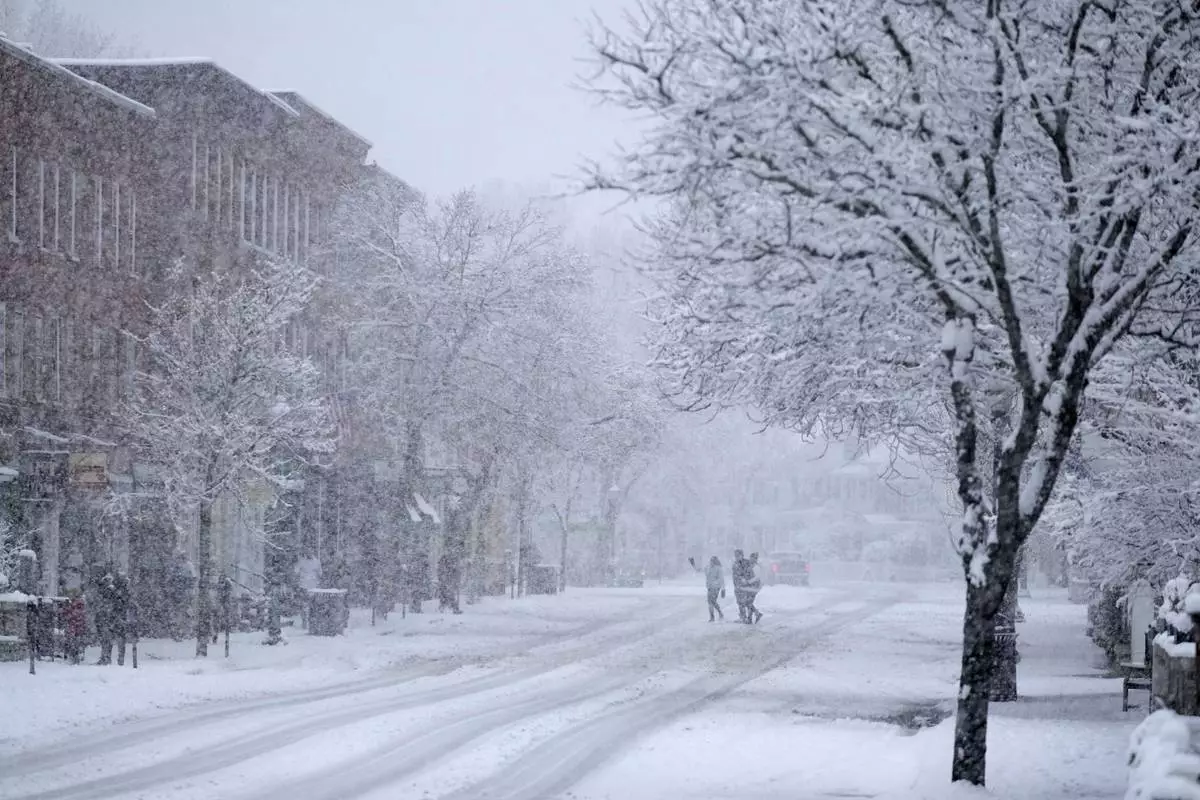
Holiday visitors walk in downtown Woodstock, Vt., during a Thanksgiving Day snowstorm, Thursday, Nov. 28, 2024. (AP Photo/Robert F. Bukaty)
SEOUL, South Korea (AP) — South Korea’s opposition parties Wednesday submitted a motion to impeach President Yoon Suk Yeol over the shocking and short-lived martial law that drew heavily armed troops to encircle parliament before lawmakers climbed walls to reenter the building and unanimously voted to lift his order.
Impeaching Yoon would require the support of two-thirds of parliament, and at least six justices of the nine-member Constitutional Court would have to endorse it to remove him from office. The motion, submitted jointly by the main liberal opposition Democratic Party and five smaller opposition parties, could be put to a vote as early as Friday.
Yoon’s senior policy advisers and Defense Minster Kim Yong Hyun offered to resign as the nation struggles to make sense of what appeared to be a poorly-thought-out stunt. The Democratic Party on Wednesday submitted a separate motion to impeach Kim, who it alleged recommended the martial law declaration to Yoon.
In his speech announcing the abrupt order Tuesday night, Yoon vowed to eliminate “anti-state” forces and continued to criticize the Democratic Party's attempts to impeach key government officials and senior prosecutors. But martial law lasted only about six hours, as the National Assembly voted to overrule Yoon before his Cabinet formally lifted it around 4:30 a.m.
The Democratic Party, which holds a majority in the 300-seat parliament, said Wednesday that its lawmakers decided to call on Yoon to quit immediately or they would take steps to impeach him.
“President Yoon Suk Yeol’s martial law declaration was a clear violation of the constitution. It didn’t abide by any requirements to declare it,” a party statement said. “His martial law declaration was originally invalid and a grave violation of the constitution. It was a grave act of rebellion and provides perfect grounds for his impeachment.”
Impeaching him would require support from 200 of the National Assembly's 300 members. The Democratic Party and other small opposition parties together have 192 seats. But the rejection of Yoon’s martial law declaration in a 190-0 vote included the votes of 18 lawmakers from Yoon’s ruling People Power Party, according to National Assembly officials. PPP leader Han Dong-hun and Seoul Mayor Oh Se-hoon, also a member, criticized Yoon's martial law declaration.
Cho Jinman, a professor at Seoul’s Duksung Women’s University, said it’s highly likely that lawmakers will back Yoon’s impeachment motion given that some from the ruling party already voted down his edict.
If Yoon is impeached, he’ll be stripped of his constitutional powers until the Constitutional Court rules. Prime Minister Han Duck-soo, the No. 2 position in the South Korean government, would take over his presidential responsibilities. Han issued a public message pleading for patience and calling for Cabinet members to “fulfill your duties even after this moment.”
The Constitutional Court has only six incumbent justices following three retirements. That means all six must approve Yoon's possible impeachment motion for it to succeed. They include those appointed after Yoon took office, so the Democratic Party is expected to speed up the process of exercising its rights to recommend two of the three new justices.
Yoon’s martial law declaration, the first of its kind in more than 40 years, harkened to South Korea’s past military-backed governments when authorities occasionally proclaimed martial law and other decrees that allowed them to station combat soldiers, tanks and armored vehicles on streets or at public places like schools to prevent anti-government demonstrations. Such scenes of military intervention had not been seen since South Korea achieved a democracy in the late 1980s until Tuesday night.
After Yoon’s declaration, troops carrying full battle gear, including assault rifles, tried to keep protesters away from the National Assembly as military helicopters flew overhead and landed nearby. One soldier pointed his assault rifle at a woman who was among protesters outside the building demanding that the martial law be lifted.
It wasn’t clear how the 190 lawmakers were able to enter a parliamentary hall to vote down Yoon’s martial law decree. Opposition leader Lee Jae-myung and National Assembly Speaker Woo Won Shik were seen climbing over walls. As troops and police officers blocked some from entering, they didn’t aggressively restrain or use force against others.
No major violence has been reported. The troops and police personnel were later seen leaving the grounds of the National Assembly after the parliamentary vote to lift the martial law. Woo said: “Even with our unfortunate memories of military coups, our citizens have surely observed the events of today and saw the maturity of our military.”
Under South Korea’s constitution, the president can declare martial law during “wartime, war-like situations or other comparable national emergency states” that require the use of military force to restrict the freedom of press, assembly and other rights to maintain order. Many observers question whether South Korea is currently in such a state.
The constitution also states that the president must oblige when the National Assembly demands the lifting of martial law with a majority vote.
A presidential official said that Yoon decided to impose martial law as a way to resolve a political deadlock and did it in the middle of night to minimize its negative impacts on the economy. The official requested anonymity to discuss sensitive nature of the issue.
Some experts say Yoon clearly violated the constitution in how he imposed martial law. While martial law allows “special measures” to restrict individual freedoms and the authority of agencies and courts, the constitution does not permit the functions of parliament to be restricted. But in following Yoon’s declaration on Tuesday, South Korea’s military proclaimed parliamentary activities were suspended and deployed troops to try to block lawmakers from entering the National Assembly.
Park Chan-dae, the Democratic Party’s floor leader, called for Yoon to be immediately investigated on charges of rebellion over the way he deployed troops to the parliament. While the president mostly enjoys immunity from prosecution while in office, the protection does not extend to alleged rebellion or treason.
In Washington, the White House said the U.S. was “seriously concerned” by the events in Seoul. A spokesperson for the National Security Council said President Joe Biden’s administration was not notified in advance of the martial law announcement and was in contact with the South Korean government.
In Seoul, the streets seemed busy like a normal day Wednesday.
Tourist Stephen Rowan, from Brisbane, Australia, who was touring Gyeongbokgung Palace, said he was not concerned at all.
“But then again, I don’t understand too much about the political status in Korea,” he said. “But I hear they are now calling for the current president’s resignation, so ... apparently there’s going to be a lot of demonstrations. ... I would have been concerned if martial law had stayed enforced.”
Natalia Slavney, research analyst at the Stimson Center’s 38 North website that focuses on Korean affairs, said Yoon’s imposition of martial law was “a serious backslide of democracy” that followed a “worrying trend of abuse” since he took office in 2022.
Associated Press writer Jennifer McDermott contributed to this report.
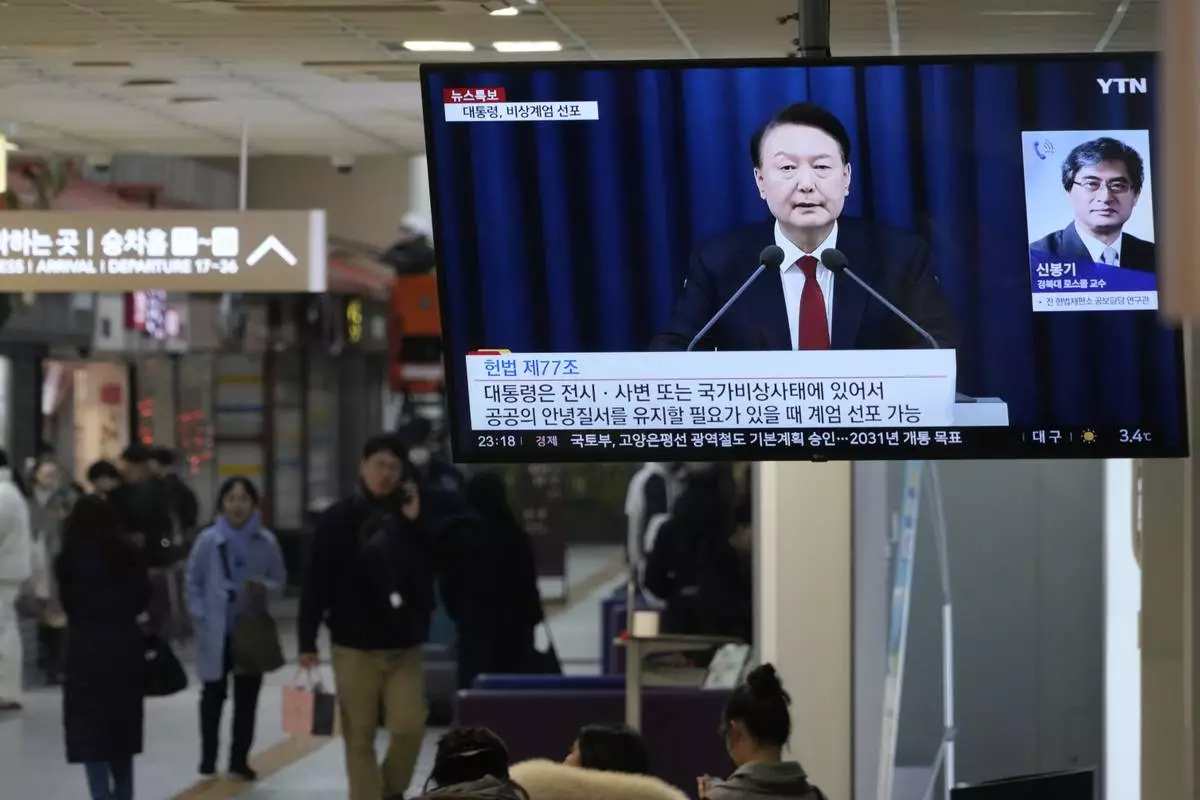
A TV screen shows South Korean President Yoon Suk Yeol's televised briefing at a bus terminal in Seoul, South Korea, Tuesday, Dec. 3, 2024. (AP Photo/Ahn Young-joon)
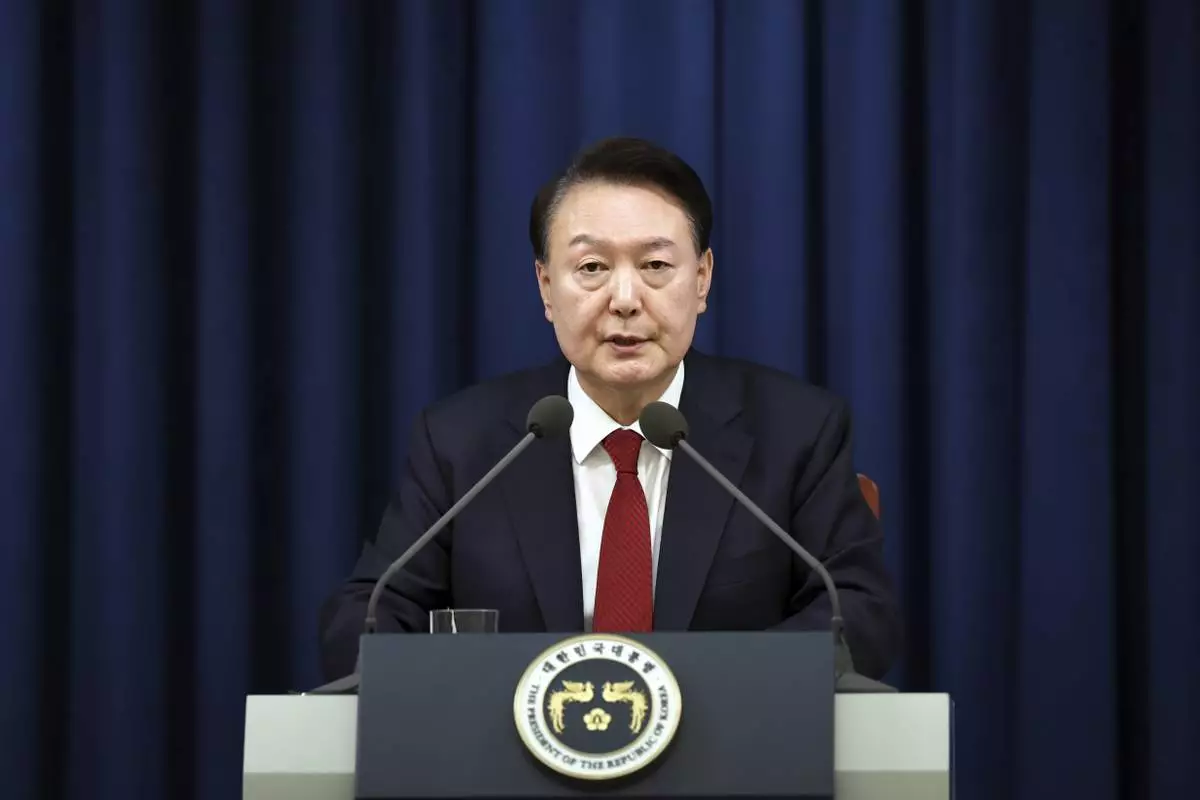
In this photo provided by South Korea Presidential Office, South Korean President Yoon Suk Yeol speaks during a press briefing at the presidential office in Seoul, South Korea, Tuesday, Dec. 3, 2024. (South Korea Unification Ministry via AP).
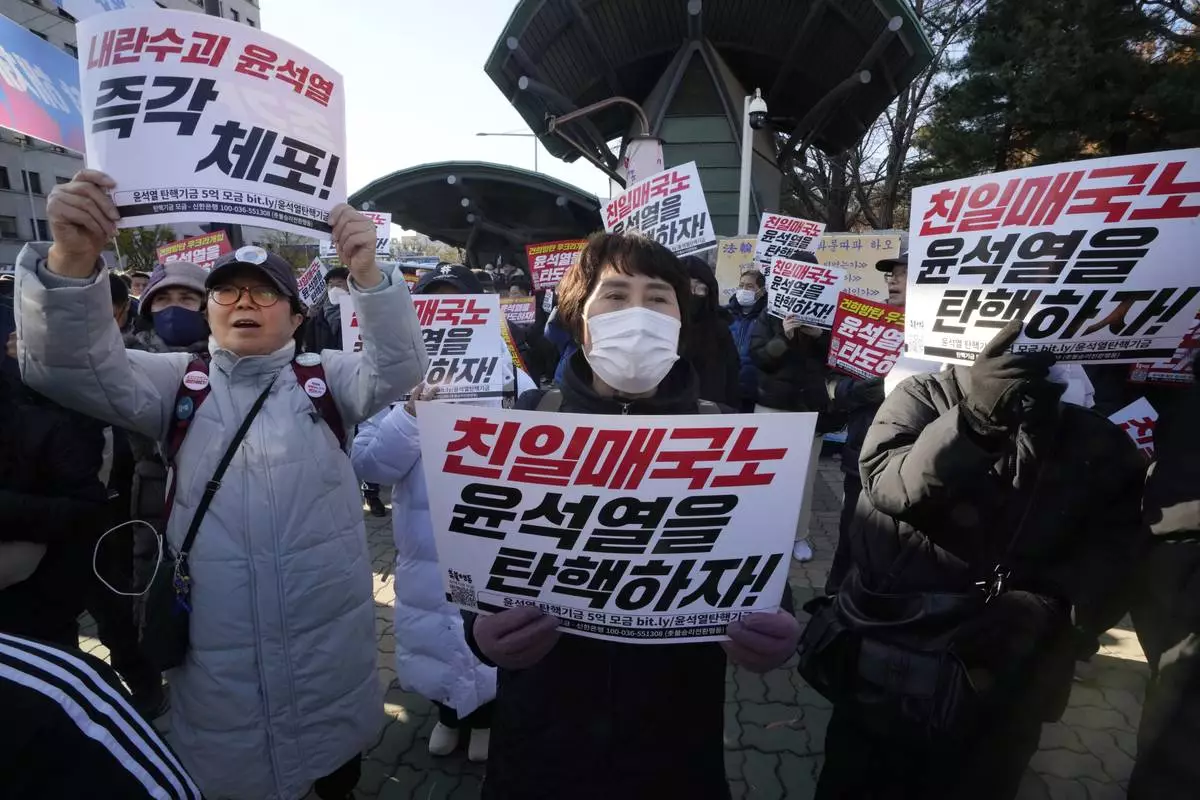
Members of main opposition Democratic Party stage a rally against South Korean President Yoon Suk Yeol in front of the National Assembly in Seoul, South Korea, Wednesday, Dec. 4, 2024. The signs read "Let's impeach Yoon Suk Yeol ." (AP Photo/Ahn Young-joon)
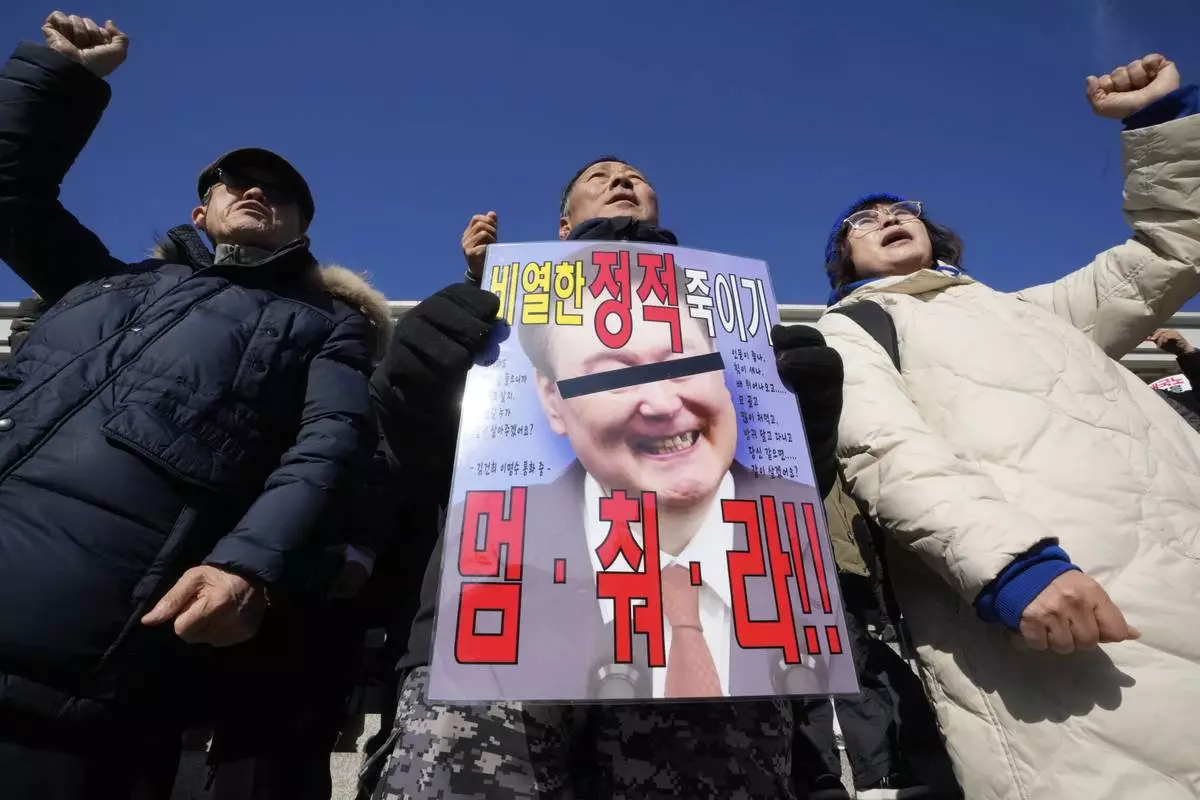
Members of main opposition Democratic Party shout slogans during a rally against South Korean President Yoon Suk Yeol at the National Assembly in Seoul, South Korea, Wednesday, Dec. 4, 2024. The signs read "Stop." (AP Photo/Ahn Young-joon)
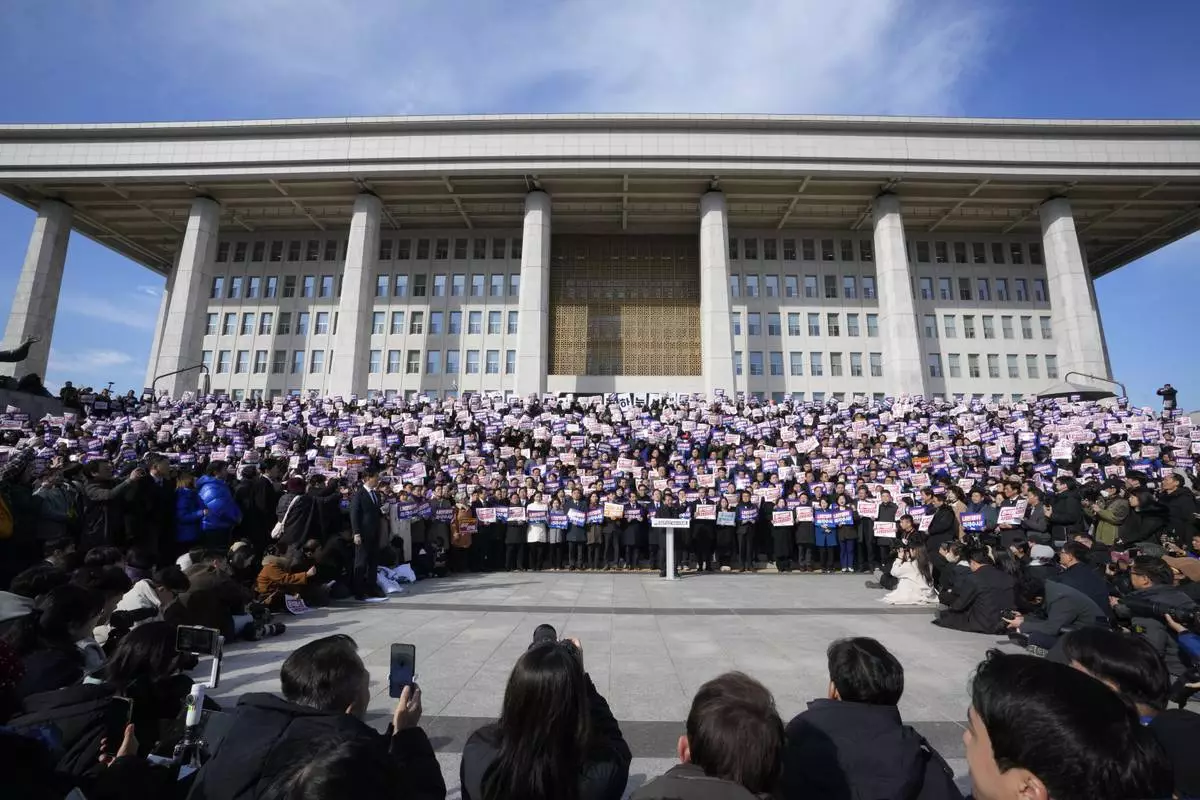
Members of main opposition Democratic Party stage a rally against South Korean President Yoon Suk Yeol at the National Assembly in Seoul, South Korea, Wednesday, Dec. 4, 2024. (AP Photo/Ahn Young-joon)
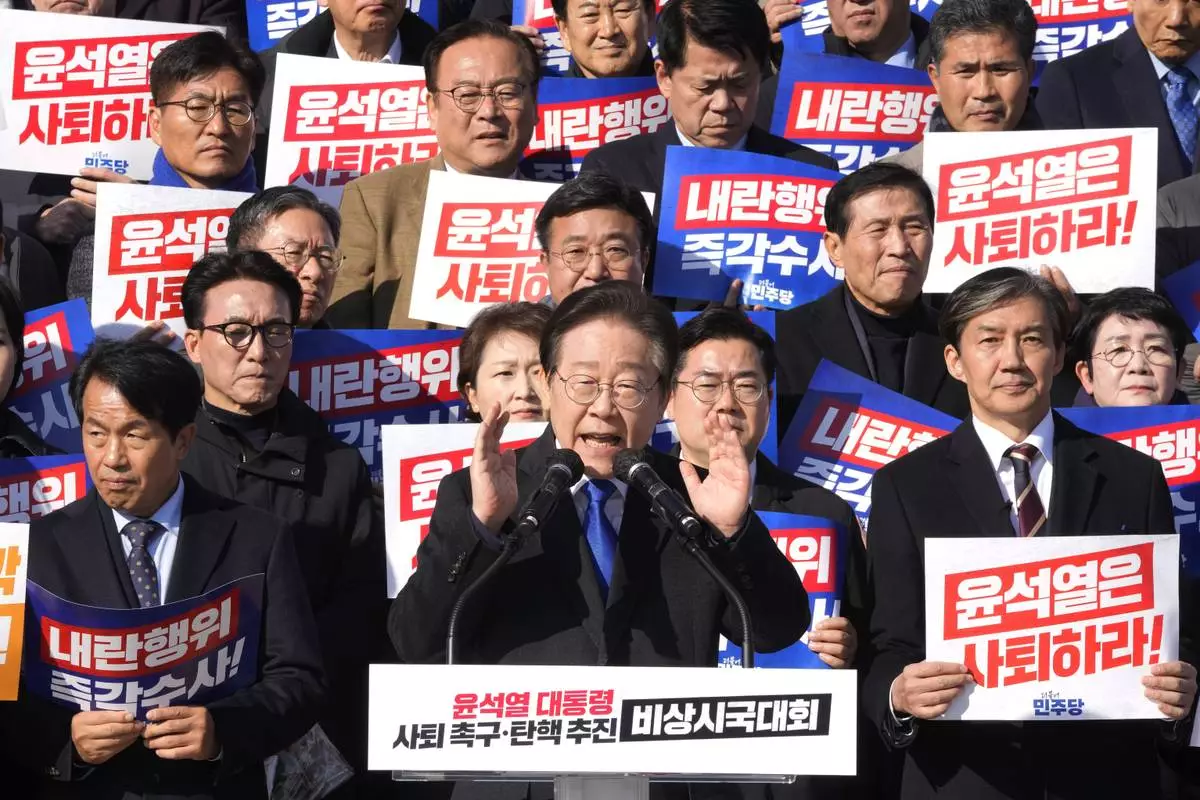
South Korea's main opposition Democratic Party leader Lee Jae-myung, bottom center, speaks during a rally against President Yoon Suk Yeol at the National Assembly in Seoul, South Korea, Wednesday, Dec. 4, 2024. The signs read "Yoon Suk Yeol should resign." (AP Photo/Ahn Young-joon)
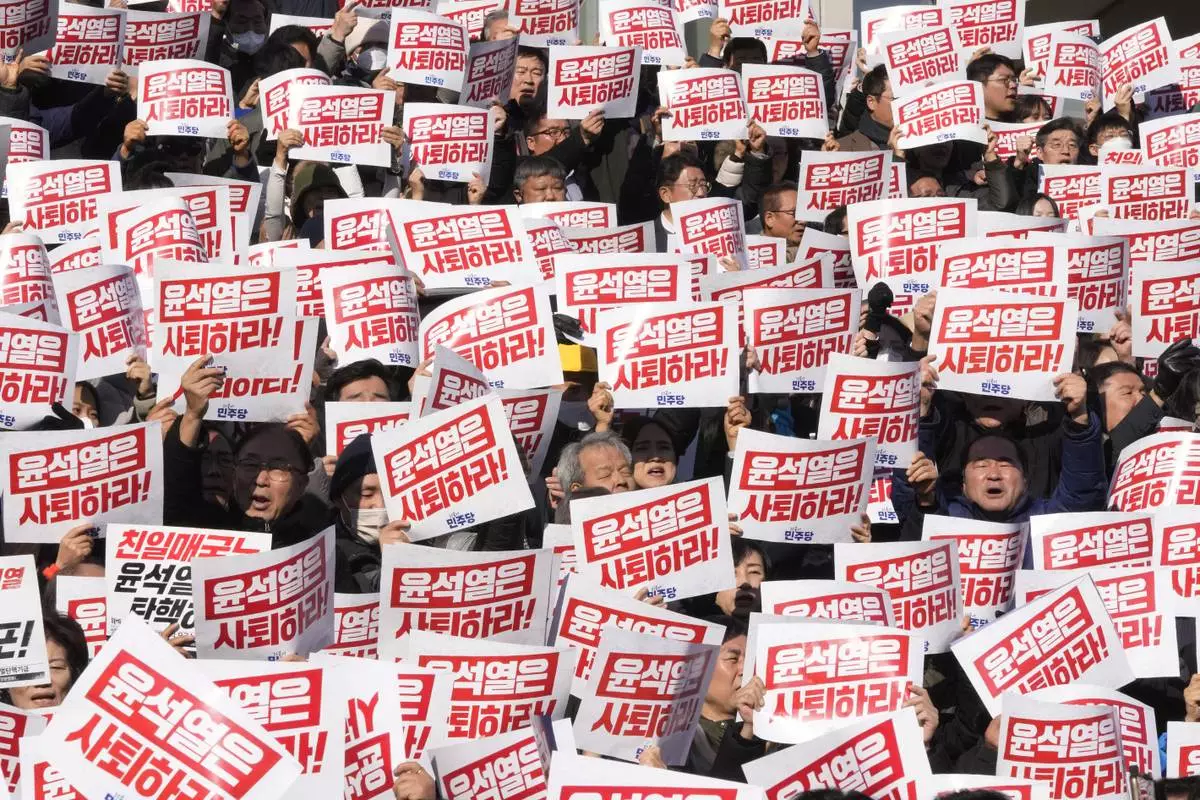
Members of main opposition Democratic Party stage a rally against South Korean President Yoon Suk Yeol at the National Assembly in Seoul, South Korea, Wednesday, Dec. 4, 2024. The signs read "Yoon Suk Yeol should resign." (AP Photo/Ahn Young-joon)
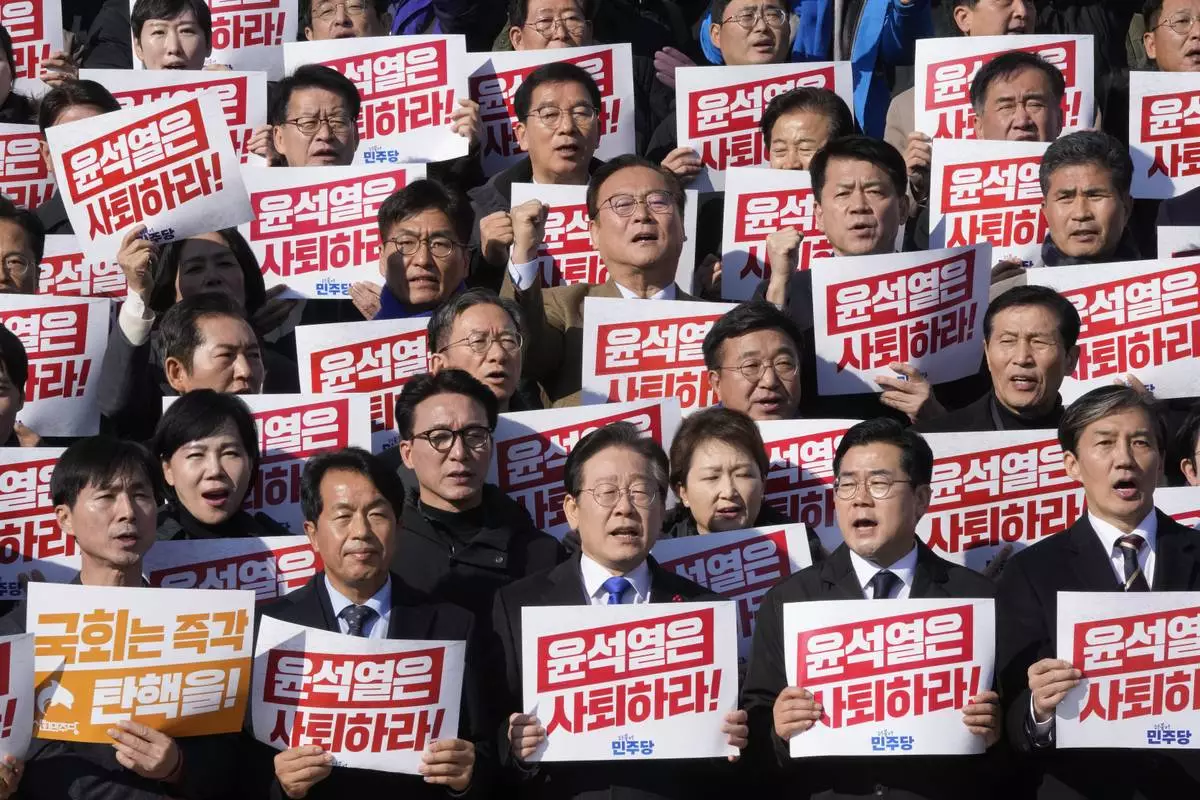
South Korea's main opposition Democratic Party leader Lee Jae-myung, bottom center, shout slogans during a rally against President Yoon Suk Yeol at the National Assembly in Seoul, South Korea, Wednesday, Dec. 4, 2024. The signs read "Yoon Suk Yeol should resign." (AP Photo/Ahn Young-joon)
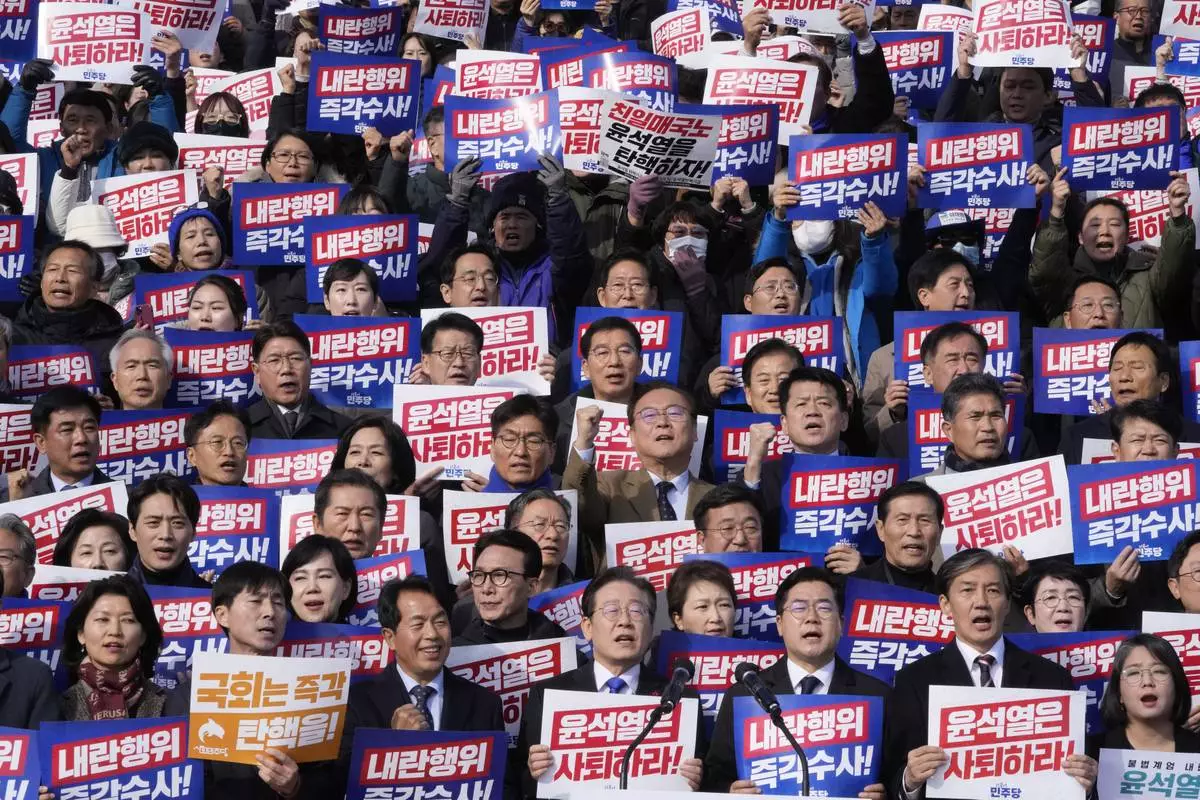
South Korea's main opposition Democratic Party leader Lee Jae-myung, bottom center, shout slogans during a rally against President Yoon Suk Yeol at the National Assembly in Seoul, South Korea, Wednesday, Dec. 4, 2024. The signs read "Yoon Suk Yeol should resign." (AP Photo/Ahn Young-joon)
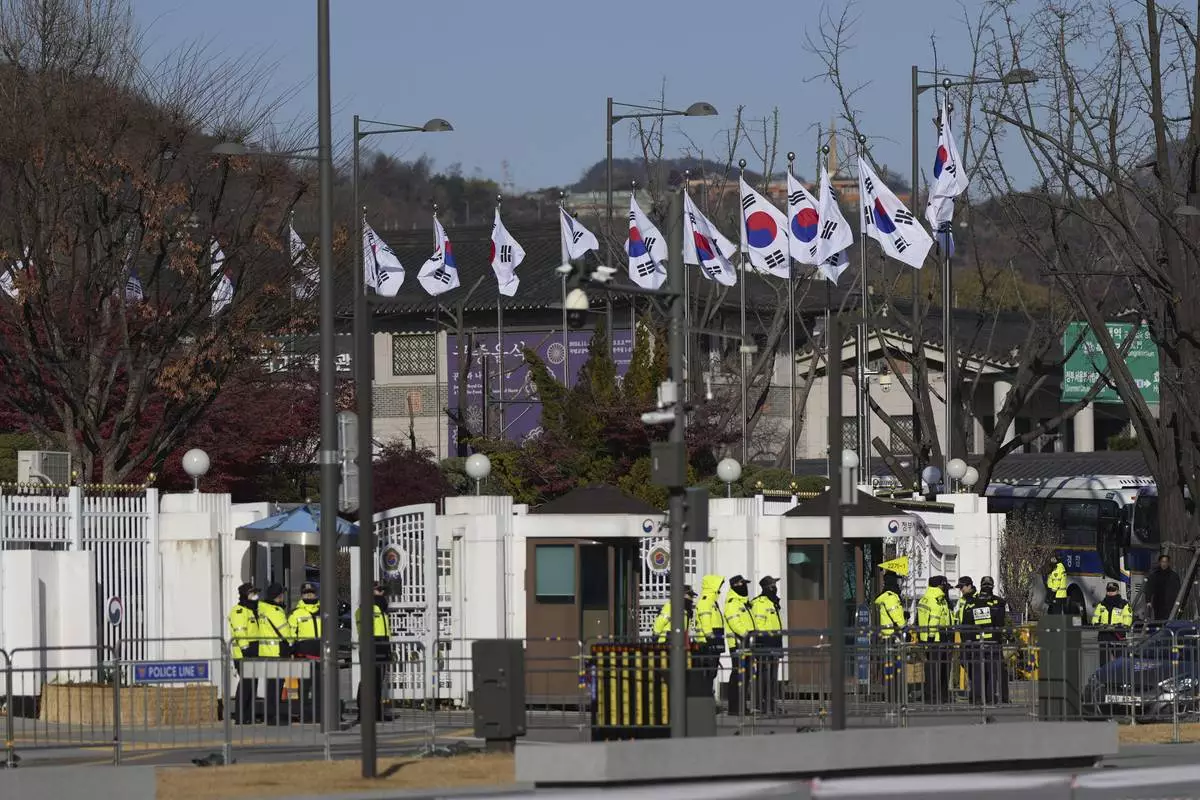
South Korean police officers stand guard in front of the government complex in Seoul, South Korea, Wednesday, Dec. 4, 2024. (AP Photo/Lee Jin-man)
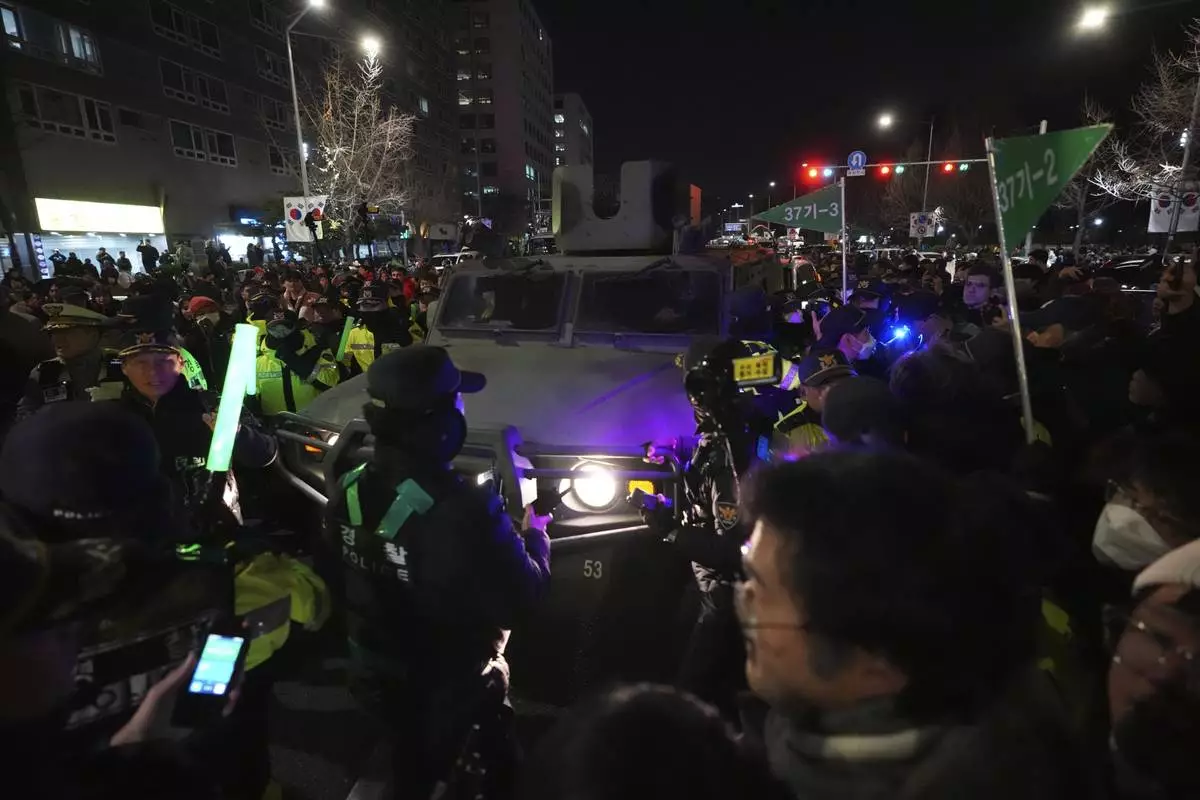
Military vehicle is escorted by police officers as people try to block outside of the National Assembly in Seoul, South Korea, Wednesday, Dec. 4, 2024. (AP Photo/Lee Jin-man)
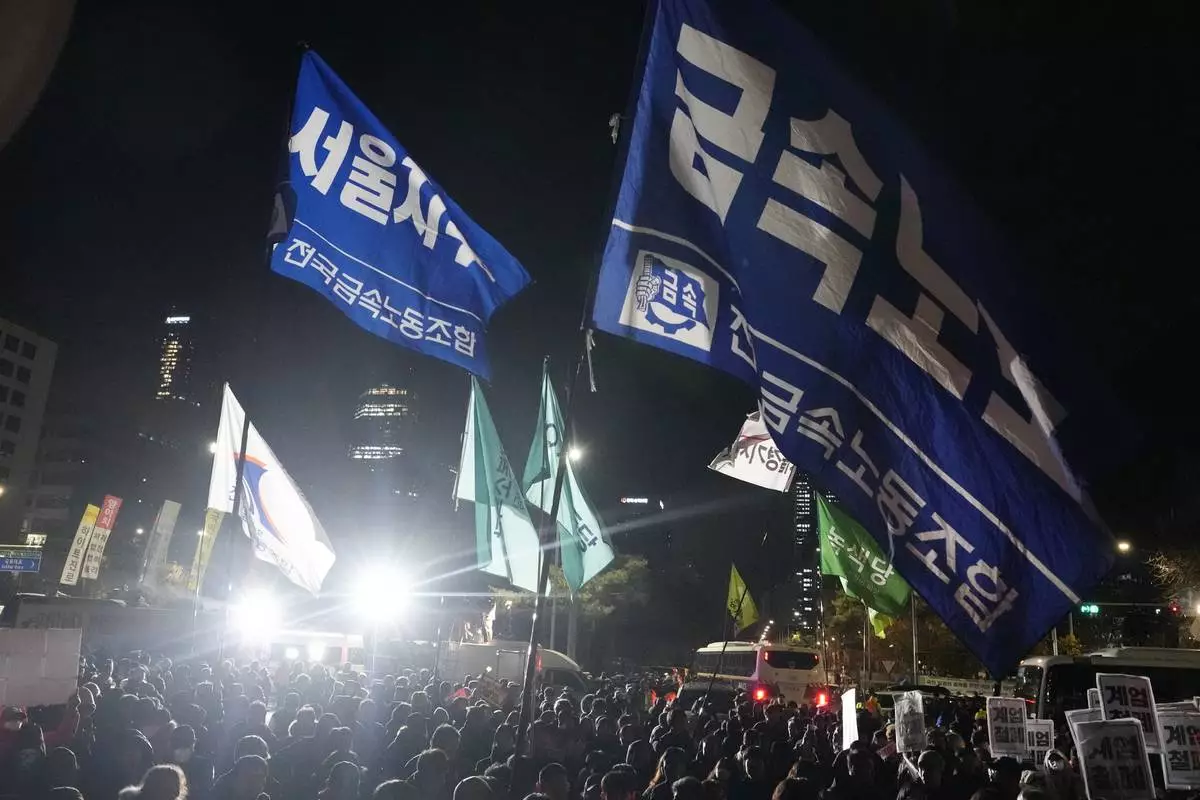
People gather to demand South Korean President Yoon Suk Yeol to step down in front of the National Assembly in Seoul, South Korea, Wednesday, Dec. 4, 2024. (AP Photo/Ahn Young-joon)
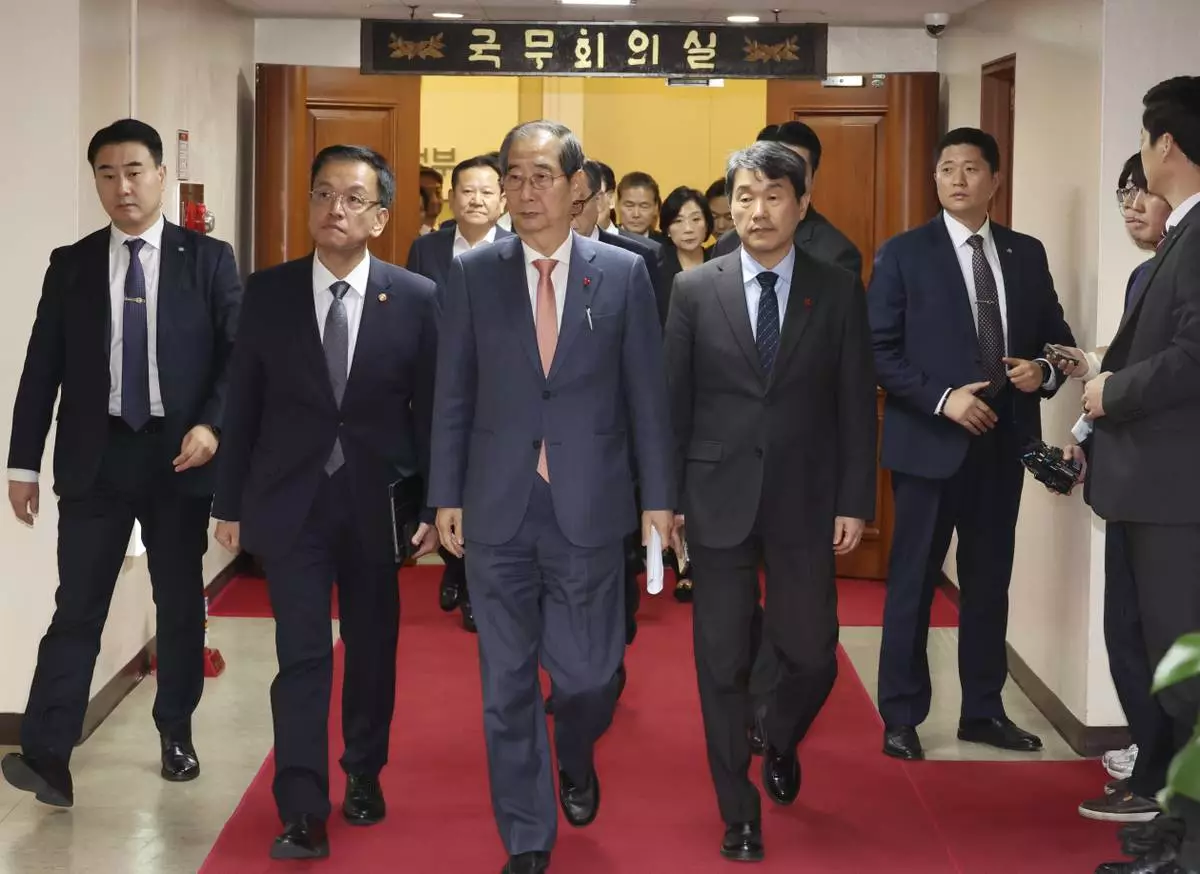
South Korean Prime Minister Han Duck-soo, center, and other ministers leave after a meeting at the government complex in Seoul, South Korea, Wednesday, Dec. 4, 2024. (Choi Jae-gu/Yonhap via AP)
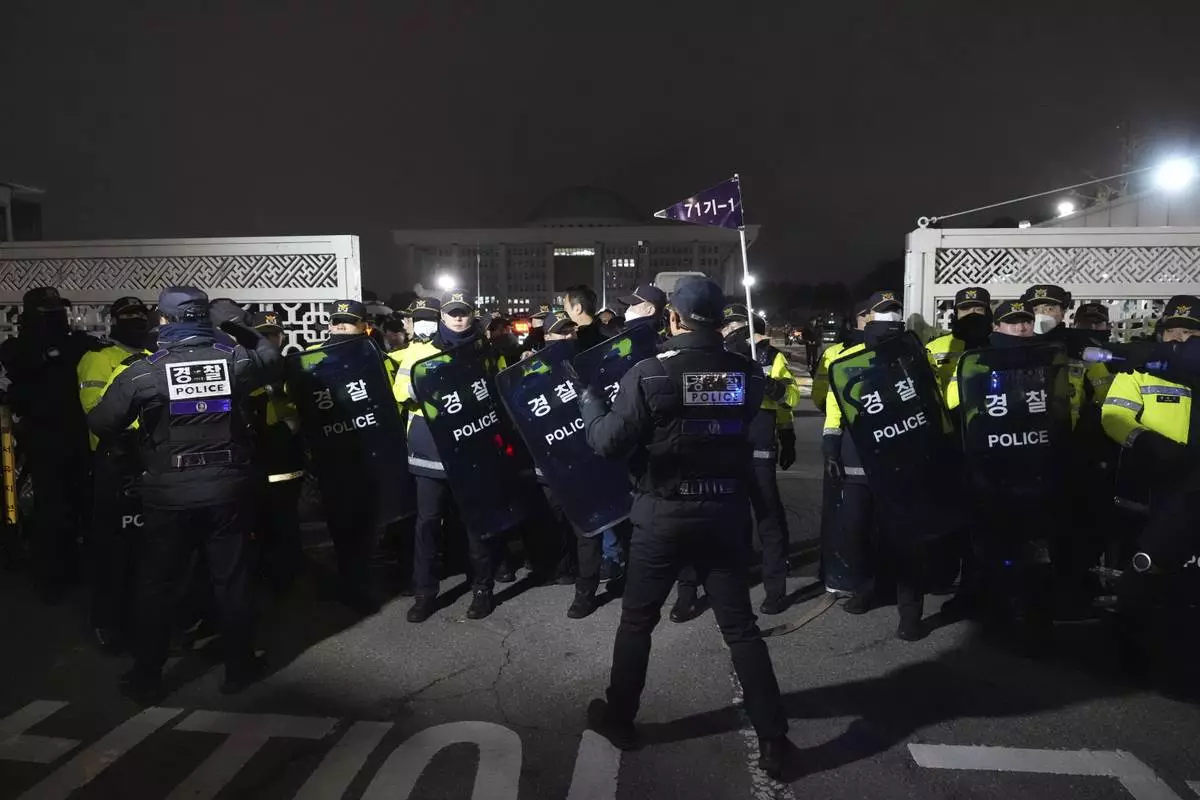
Police officers stand guard in front of the National Assembly in Seoul, South Korea, Tuesday, Dec. 3, 2024. (AP Photo/Lee Jin-man)
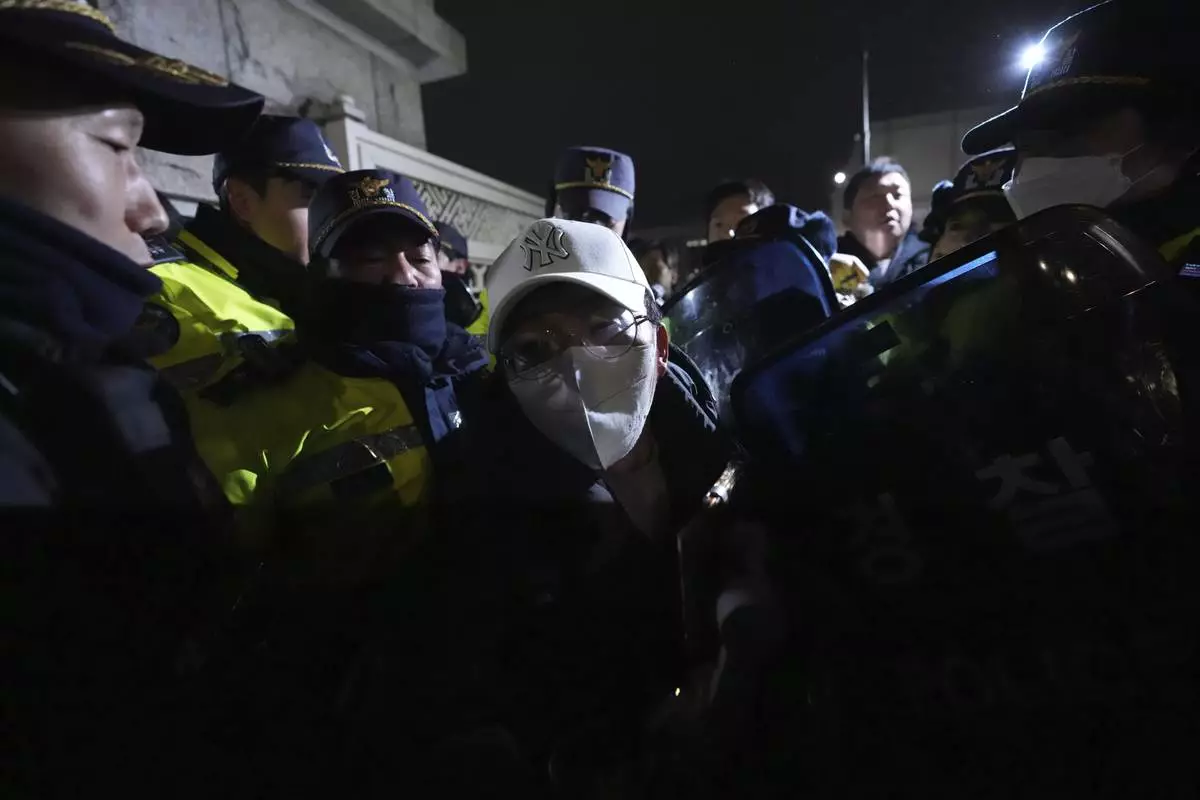
People try to enter as police officers stand guard in front of the National Assembly in Seoul, South Korea, Tuesday, Dec. 3, 2024. (AP Photo/Lee Jin-man)
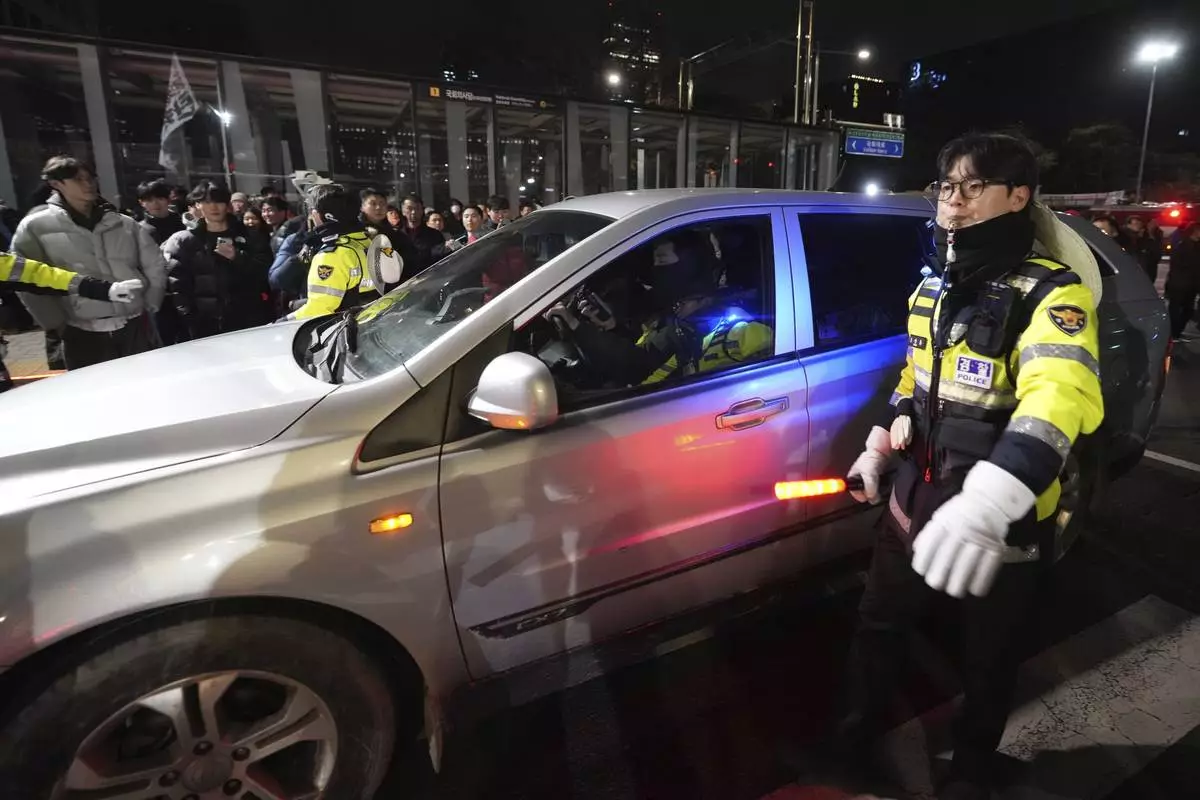
Military vehicles is escorted by police officers outside of the National Assembly in Seoul, South Korea, Wednesday, Dec. 4, 2024. (AP Photo/Lee Jin-man)
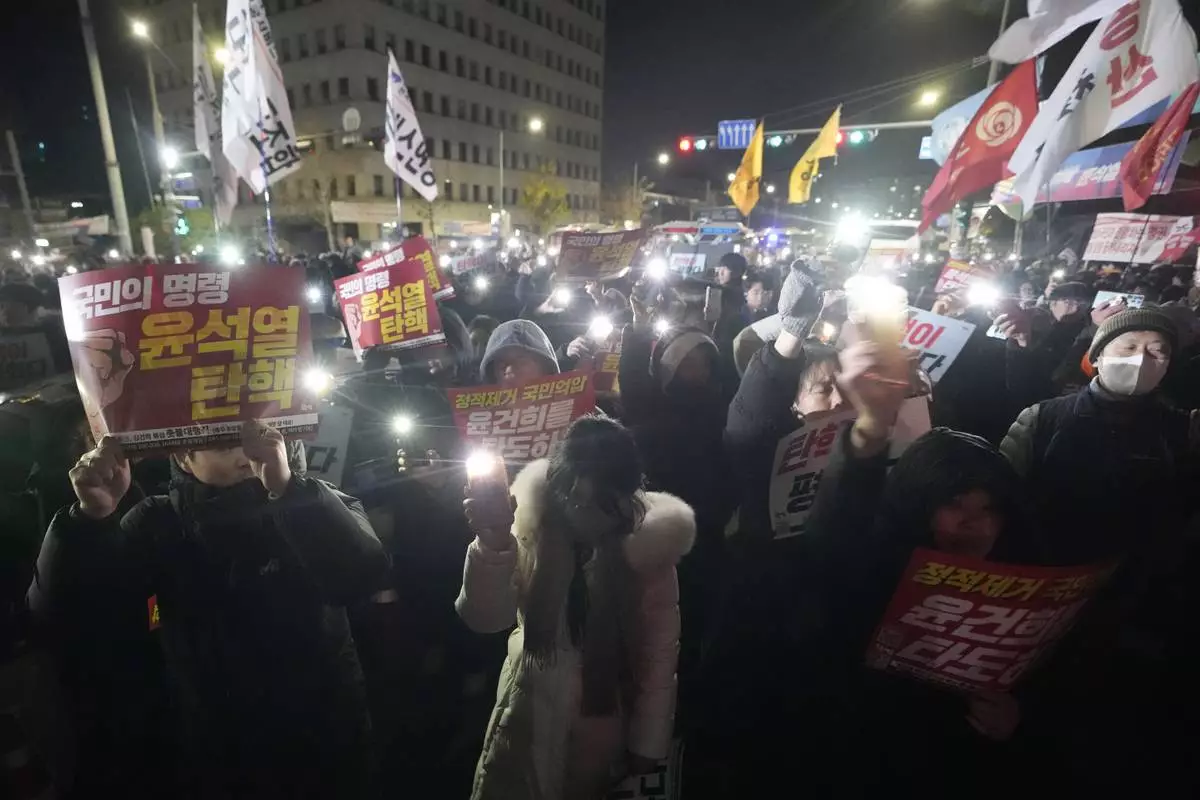
People gather to demand South Korean President Yoon Suk Yeol to step down in front of the National Assembly in Seoul, South Korea, Wednesday, Dec. 4, 2024. (AP Photo/Ahn Young-joon)
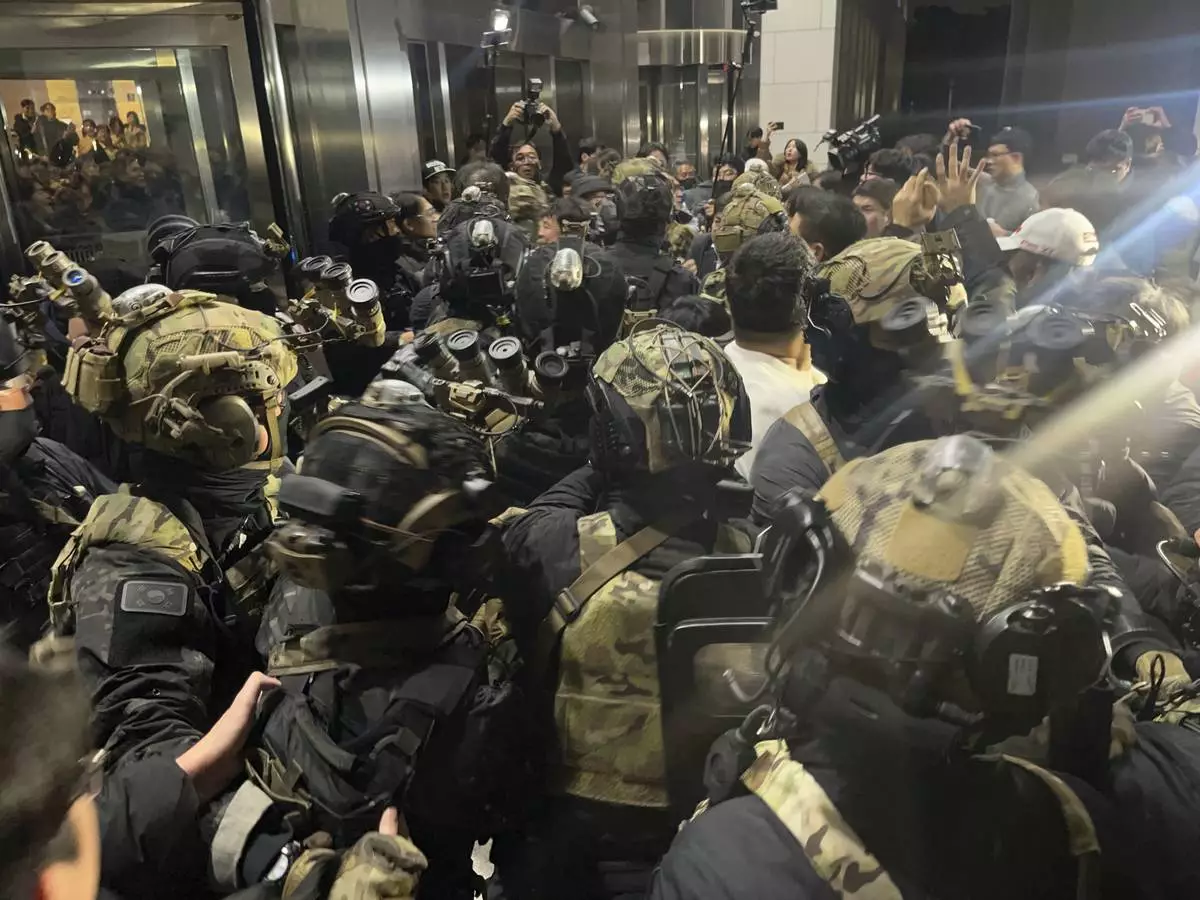
South Korean martial law soldiers try to enter the National Assembly compound in Seoul, South Korea, Wednesday, Dec. 4, 2024. (Cho Jung-woo/Newsis via AP)
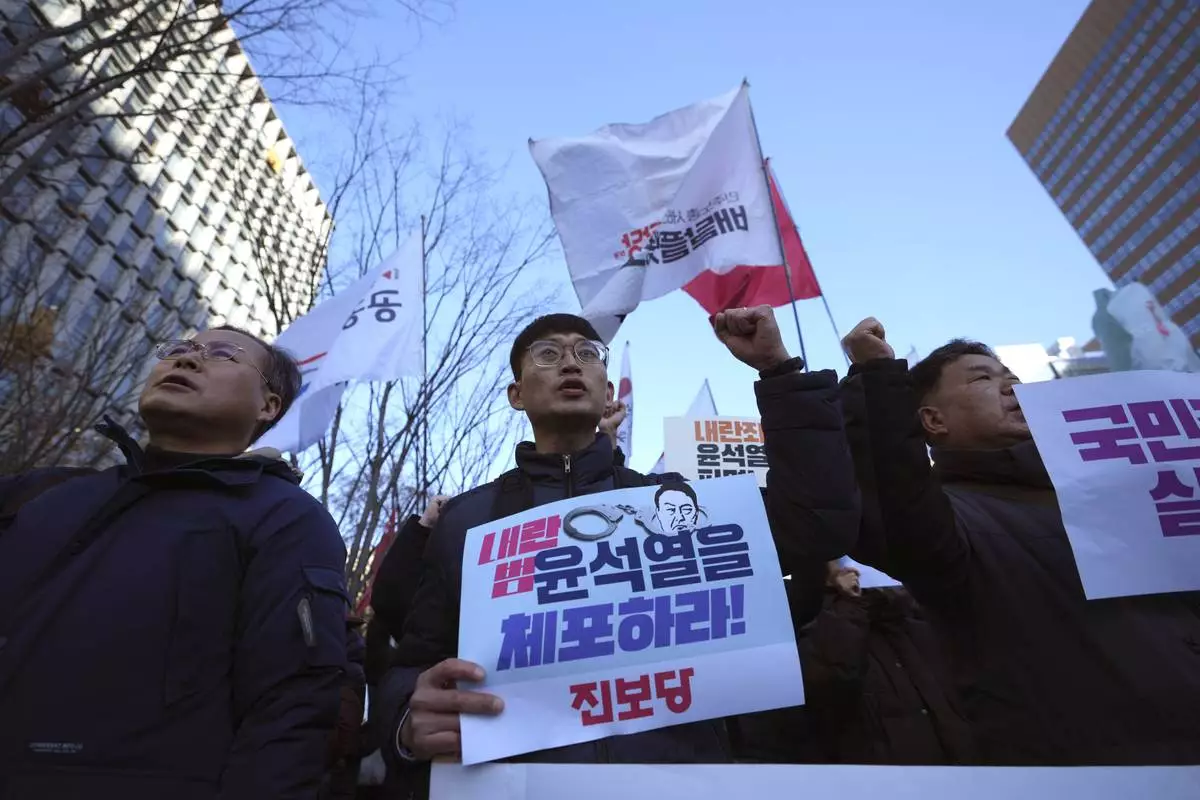
South Koreans shout slogans with signs reading "Arrest Yoon Suk Yeol" during a rally in Seoul, South Korea, Wednesday, Dec. 4, 2024. (AP Photo/Lee Jin-man)
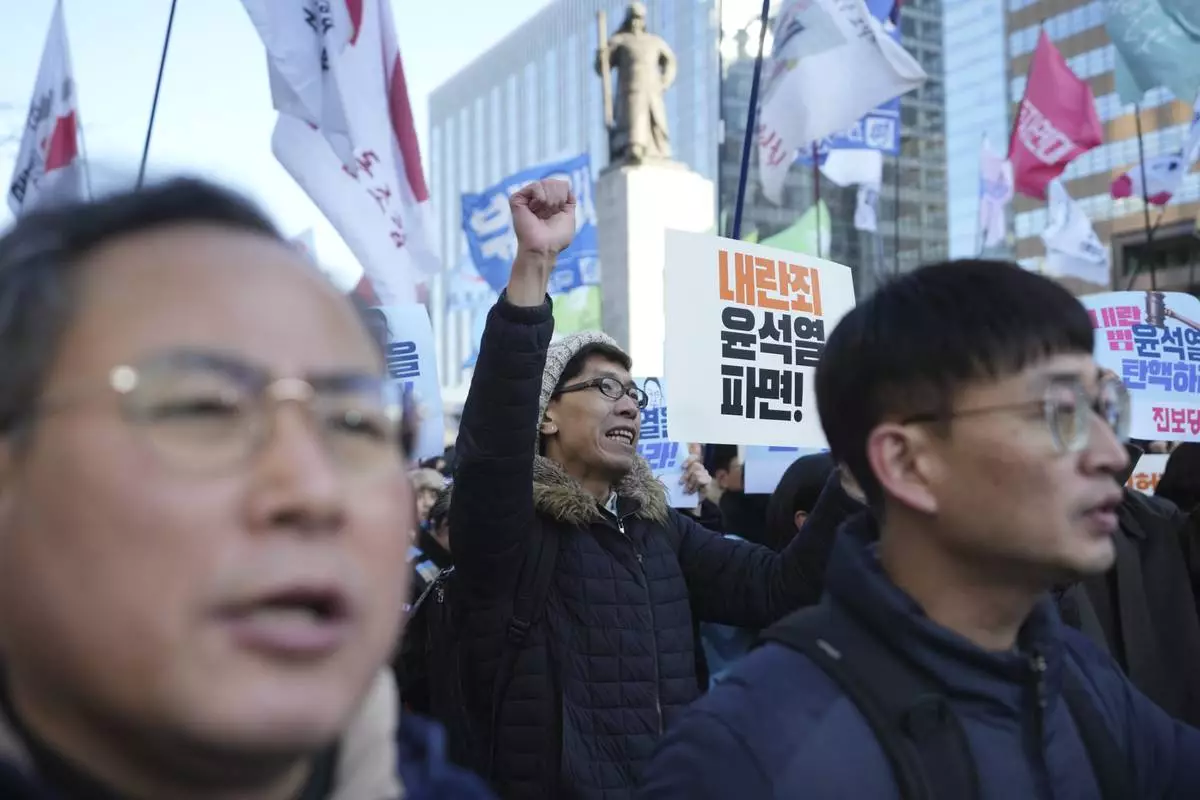
South Koreans shout slogans during a rally in Seoul, South Korea, Wednesday, Dec. 4, 2024. (AP Photo/Lee Jin-man)
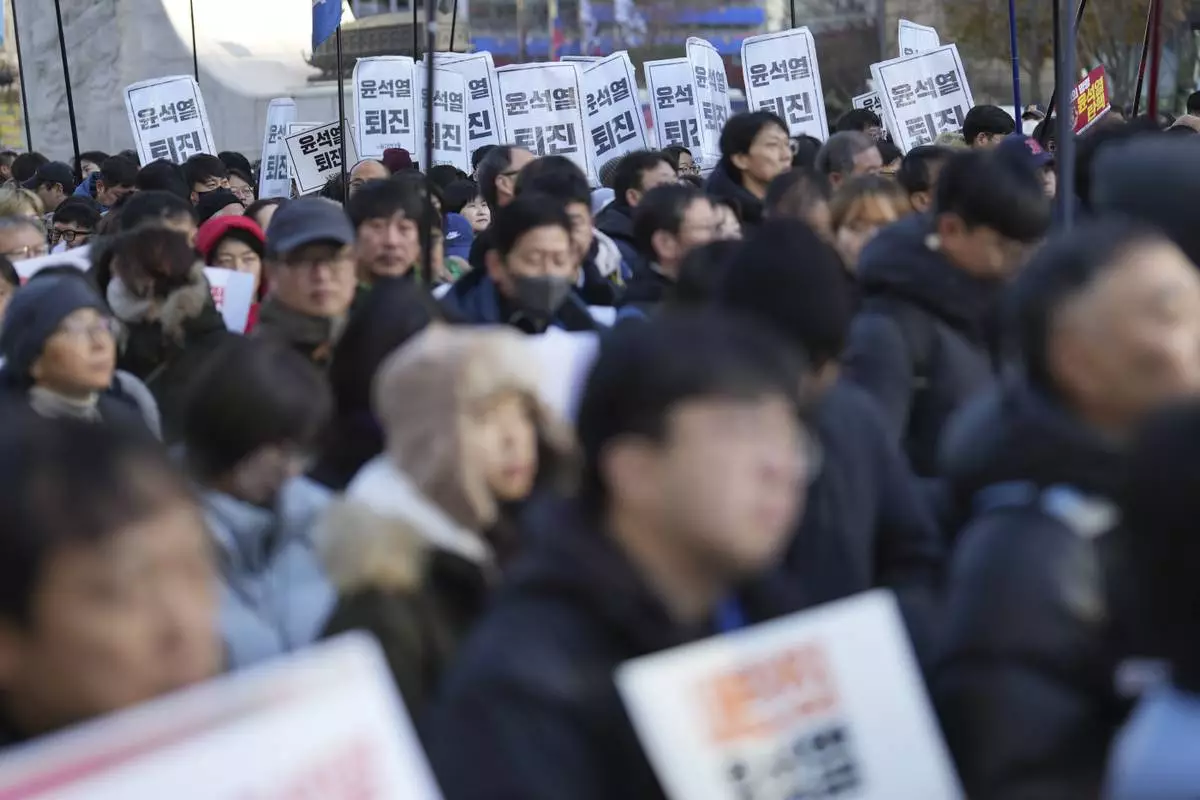
South Koreans hold signs reading "Resign Yoon Suk Yeol" during a rally in Seoul, South Korea, Wednesday, Dec. 4, 2024. (AP Photo/Lee Jin-man)
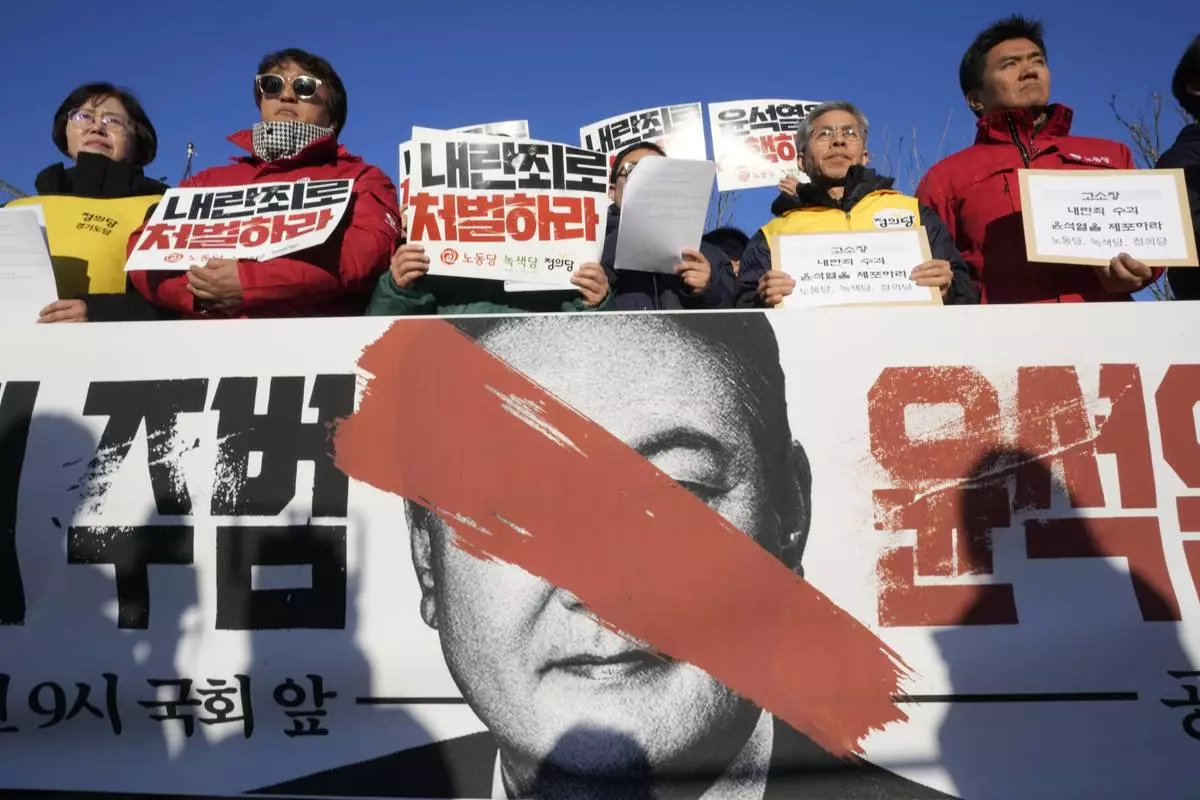
Protesters stage a rally to demand South Korean President Yoon Suk Yeol to step down in front of the National Assembly in Seoul, South Korea, Wednesday, Dec. 4, 2024. The signs read "Punish." (AP Photo/Ahn Young-joon)
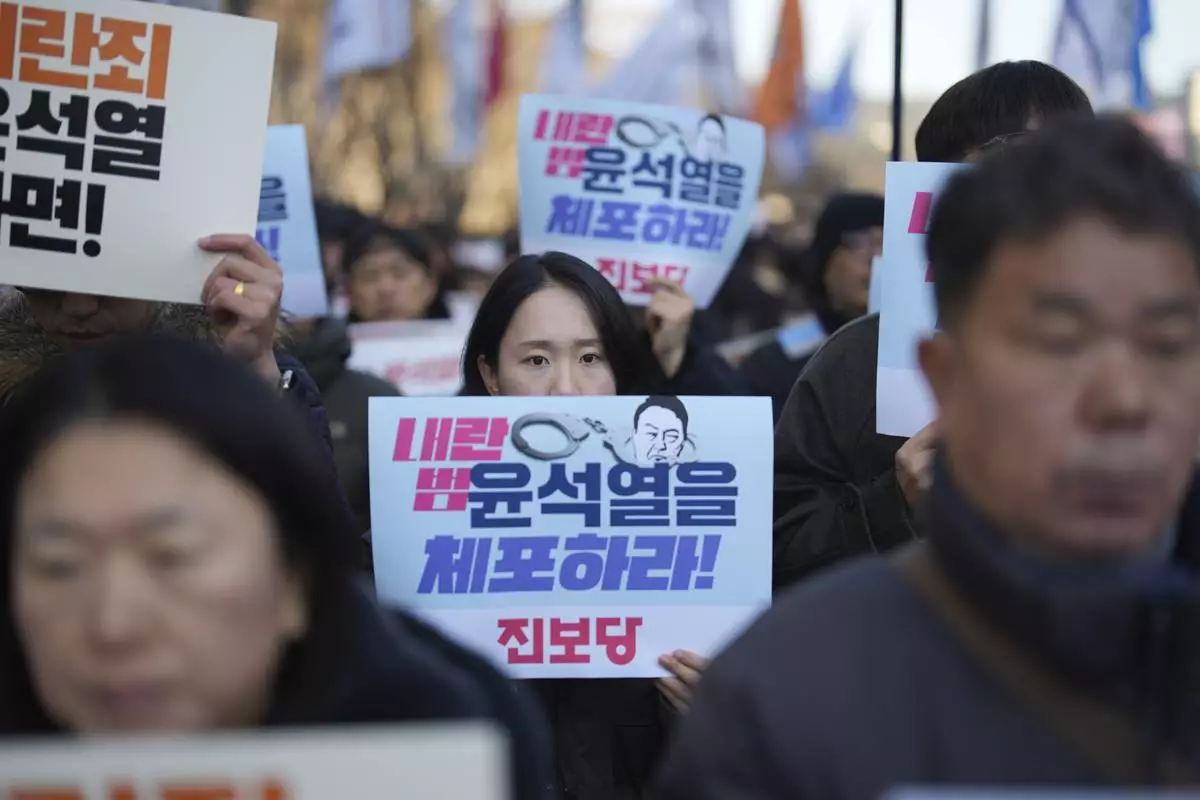
South Koreans hold signs reading "Arrest Yoon Suk Yeol" during a rally in Seoul, South Korea, Wednesday, Dec. 4, 2024. (AP Photo/Lee Jin-man)
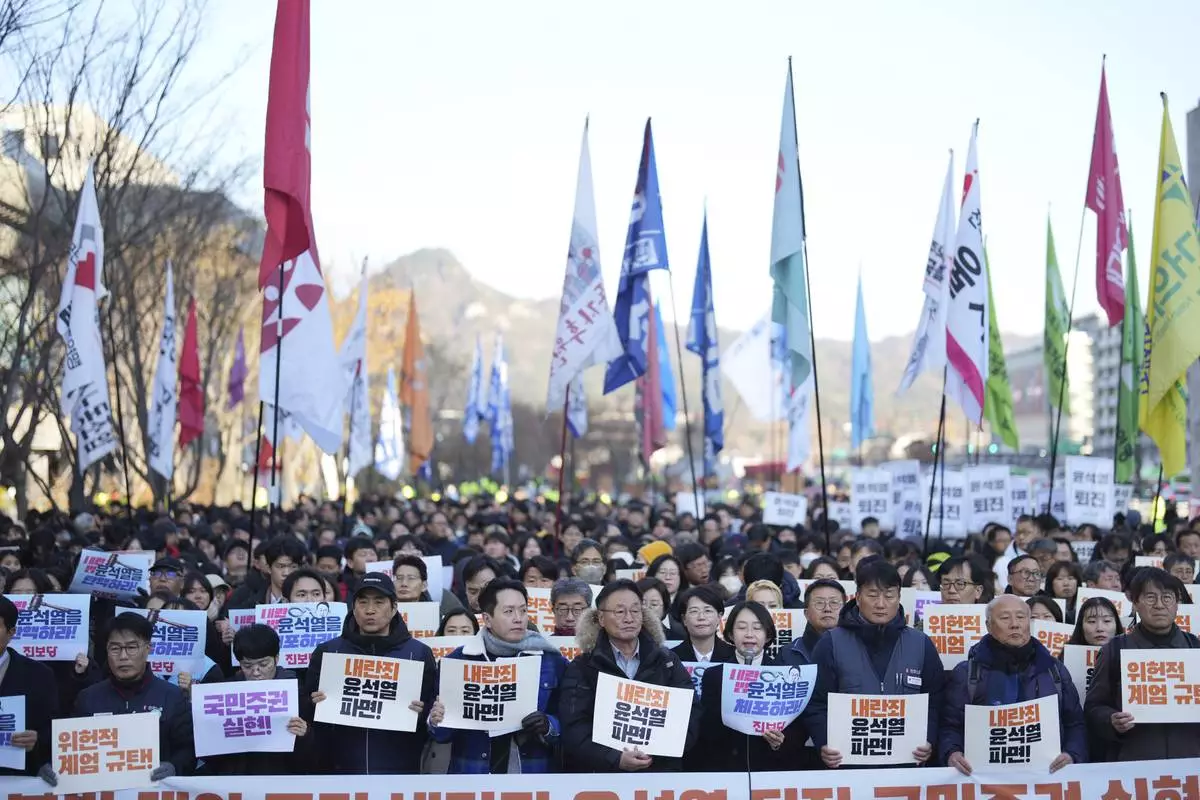
South Koreans hold signs reading "Expulsion of Yoon Suk Yeol" during a rally in Seoul, South Korea, Wednesday, Dec. 4, 2024. (AP Photo/Lee Jin-man)
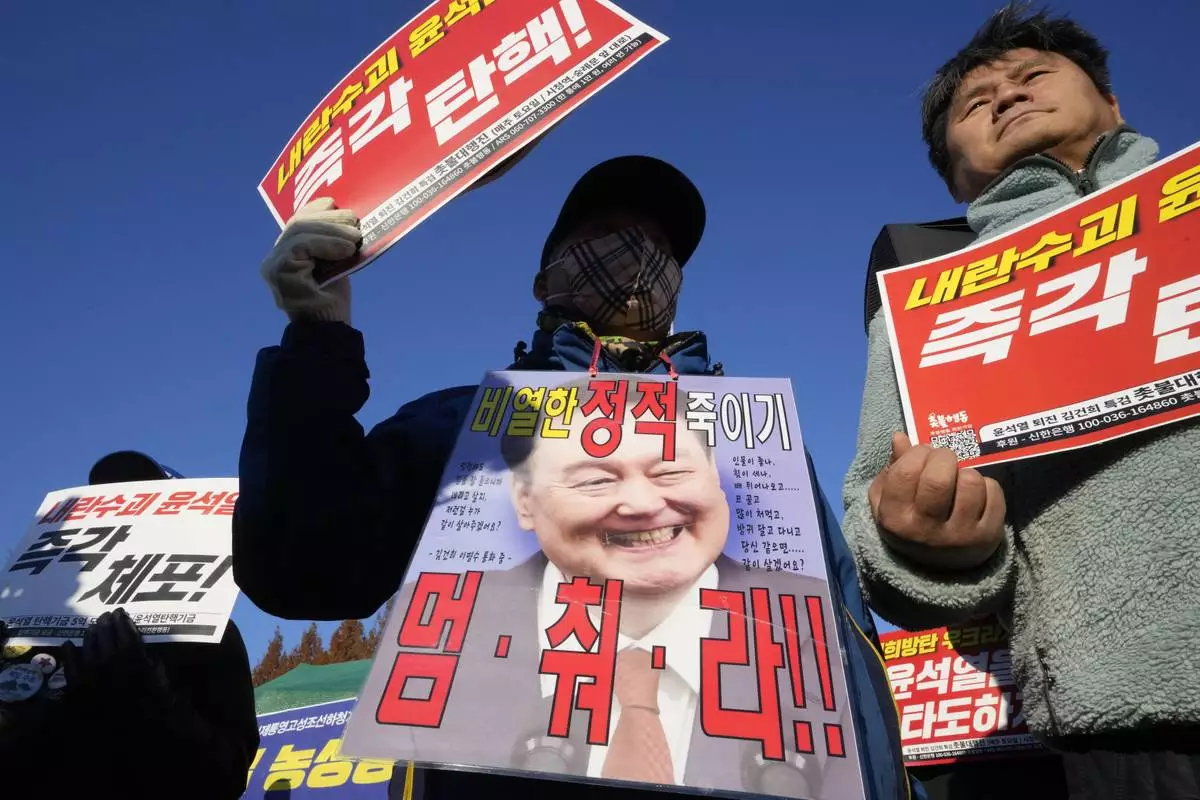
Protesters attend a rally to demand South Korean President Yoon Suk Yeol to step down in front of the National Assembly in Seoul, South Korea, Wednesday, Dec. 4, 2024. The signs read "Stop." (AP Photo/Ahn Young-joon)
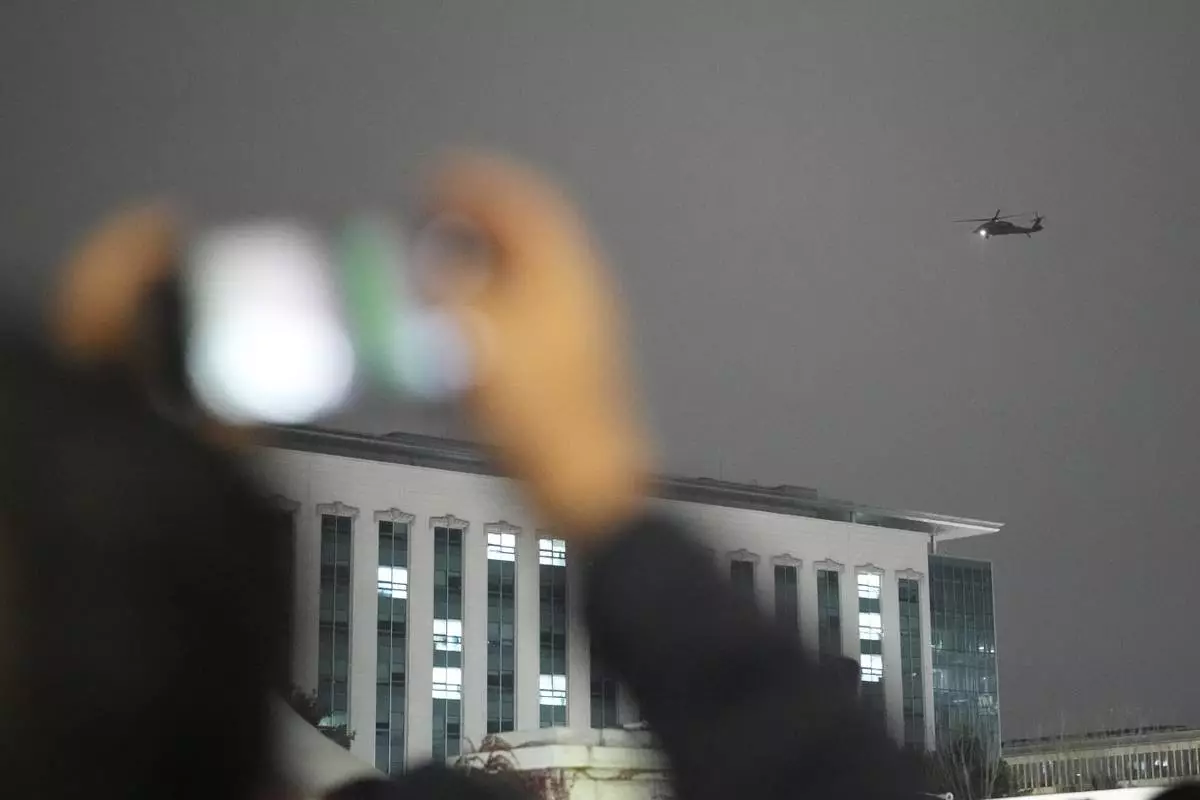
A helicopter flies over the National Assembly in Seoul, South Korea, Wednesday, Dec. 4, 2024. (AP Photo/Lee Jin-man)
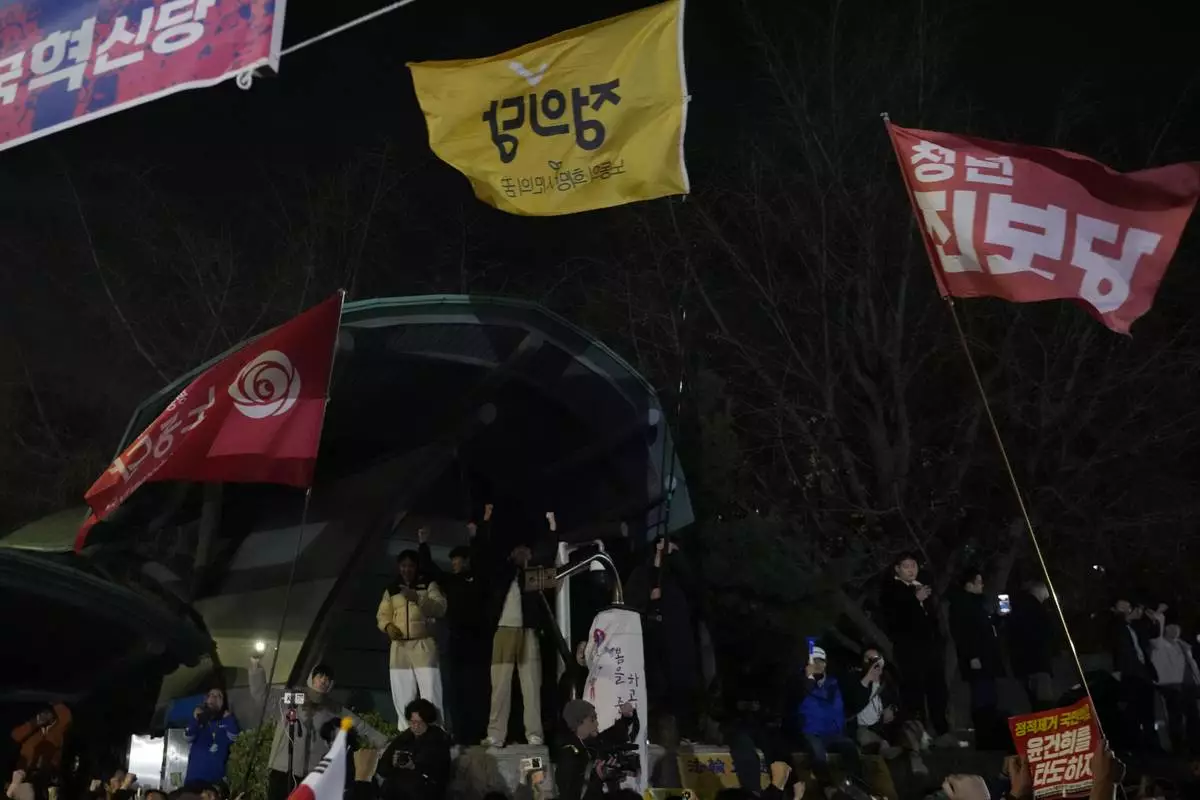
People gather in front of the National Assembly in Seoul, South Korea, Wednesday, Dec. 4, 2024. (AP Photo/Ahn Young-joon)
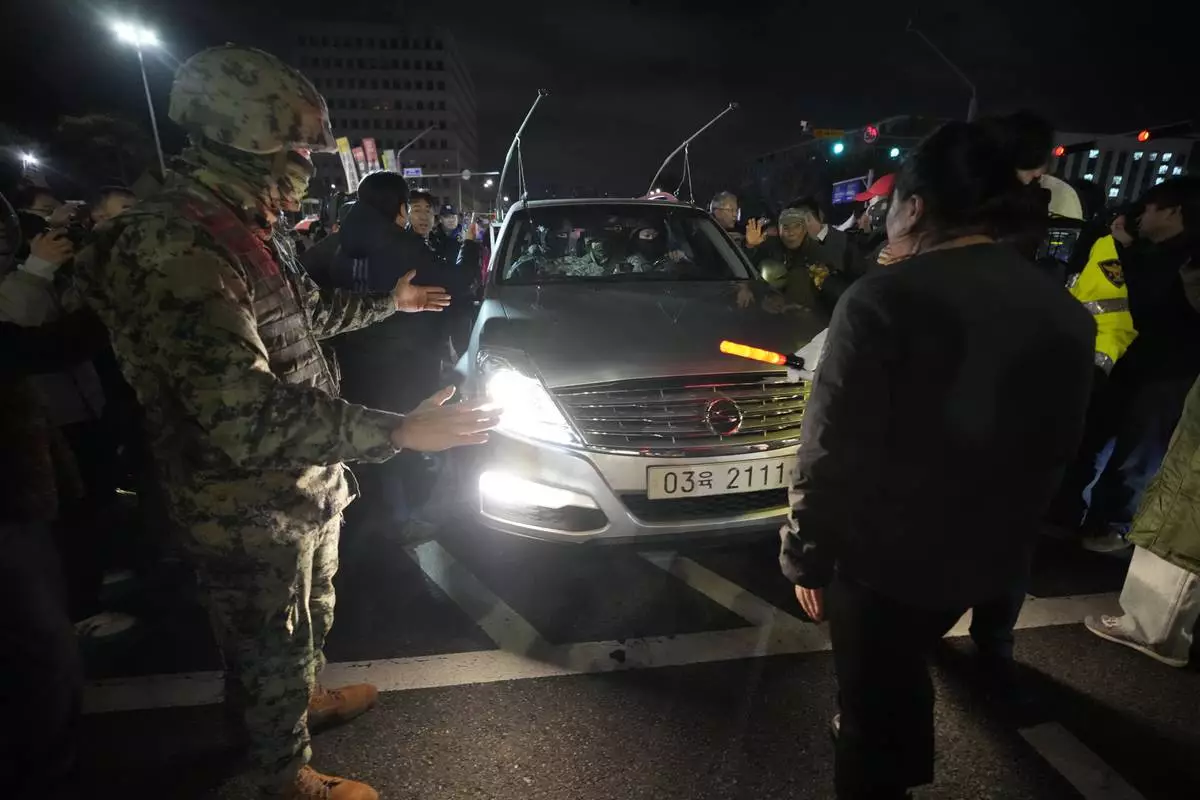
People bock a martial law vehicle as they gather to demand South Korean President Yoon Suk Yeol to step down in front of the National Assembly in Seoul, South Korea, Wednesday, Dec. 4, 2024. (AP Photo/Ahn Young-joon)
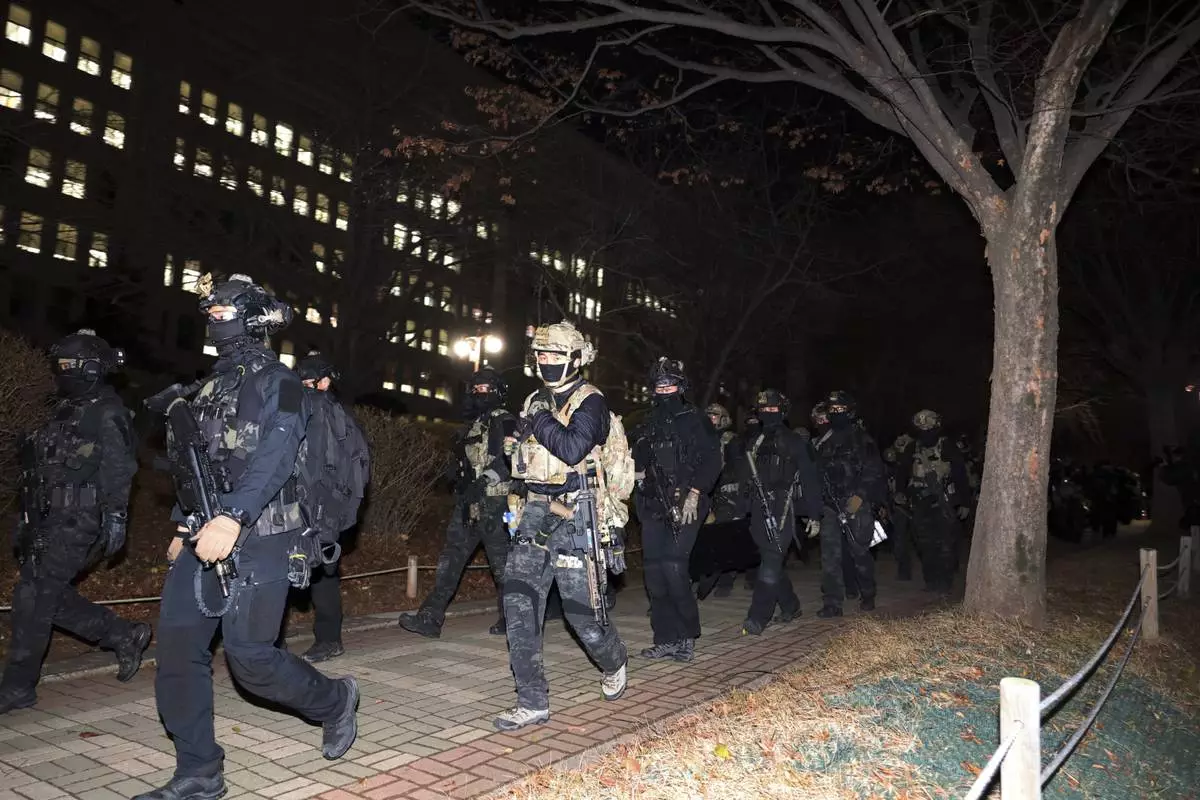
South Korean martial law soldiers leave the National Assembly in Seoul, South Korea, Wednesday, Dec. 4, 2024. (Kim Ju-sung/Yonhap via AP)
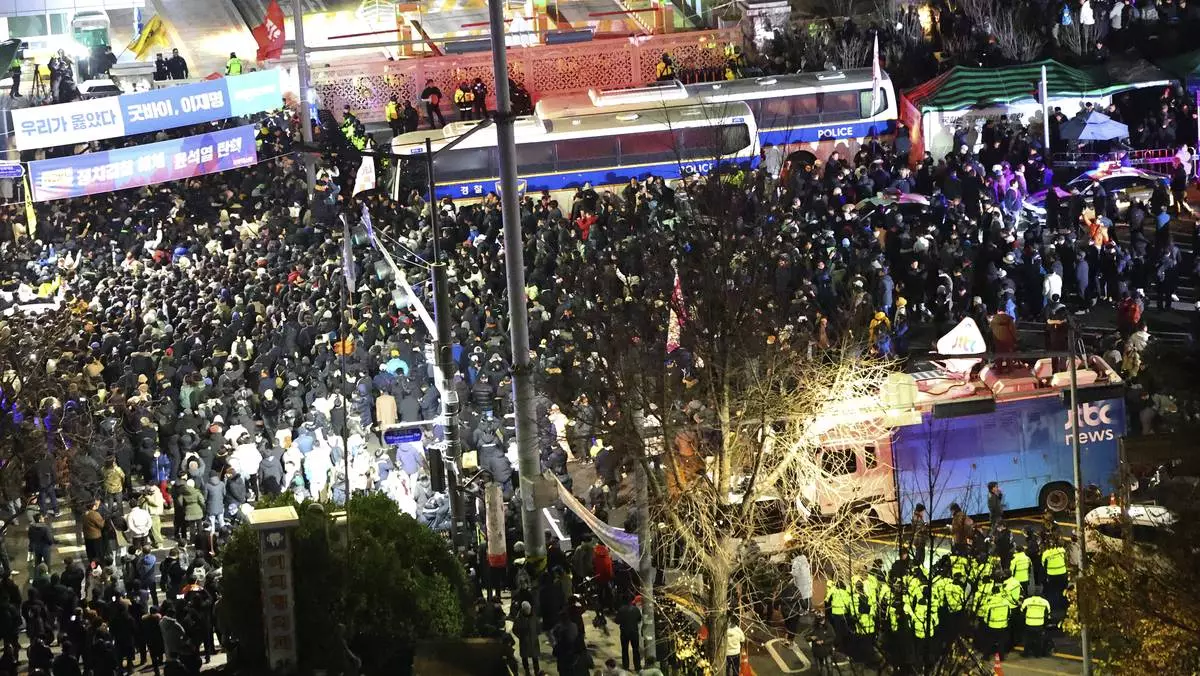
People gather to demand South Korean President Yoon Suk Yeol step down in front of the National Assembly in Seoul, South Korea, Wednesday, Dec. 4, 2024. (Kim Do-hoon/Yonhap via AP)
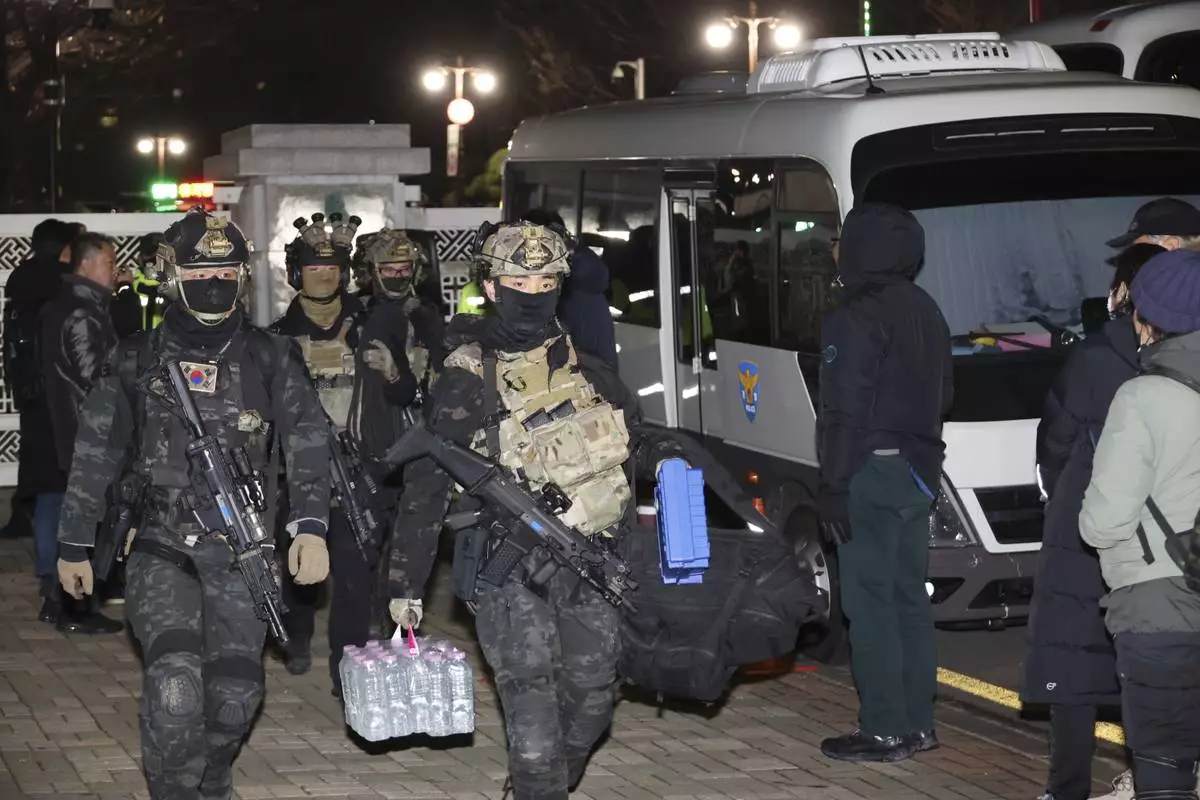
South Korean martial law soldiers leave the National Assembly in Seoul, South Korea, Wednesday, Dec. 4, 2024. (Kim Ju-sung/Yonhap via AP)
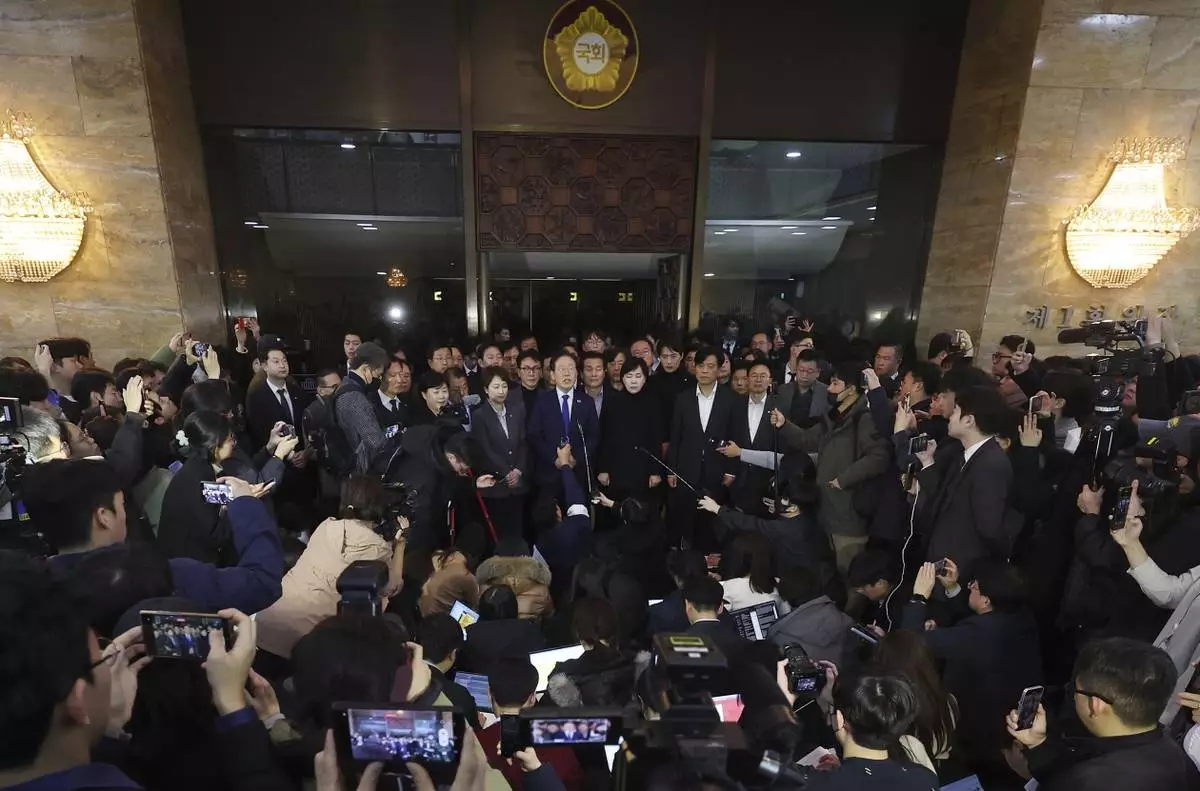
South Korea's main opposition Democratic Party leader Lee Jae-myung, top center, speaks at the National Assembly in Seoul, South Korea, Wednesday, Dec. 4, 2024. (Kim Ju-hyung/Yonhap via AP)
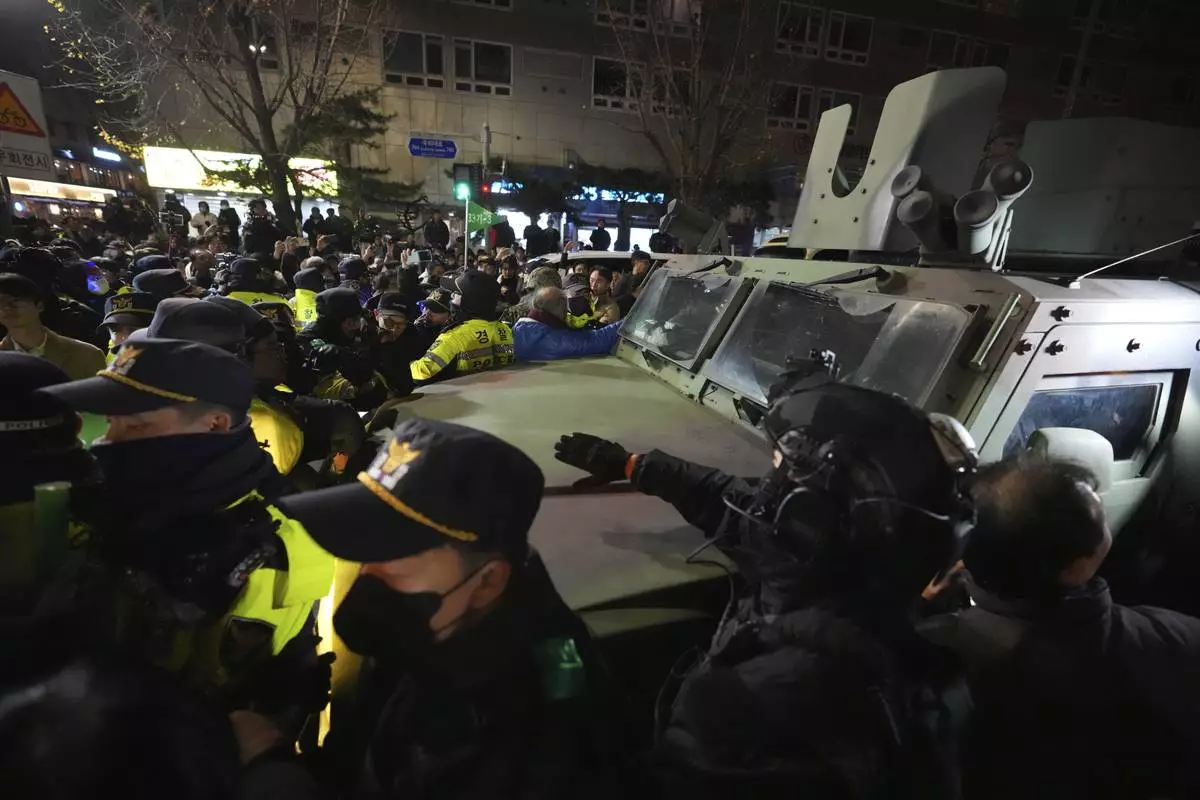
Military vehicle is escorted by police officers as people try to block outside of the National Assembly in Seoul, South Korea, Wednesday, Dec. 4, 2024. (AP Photo/Lee Jin-man)
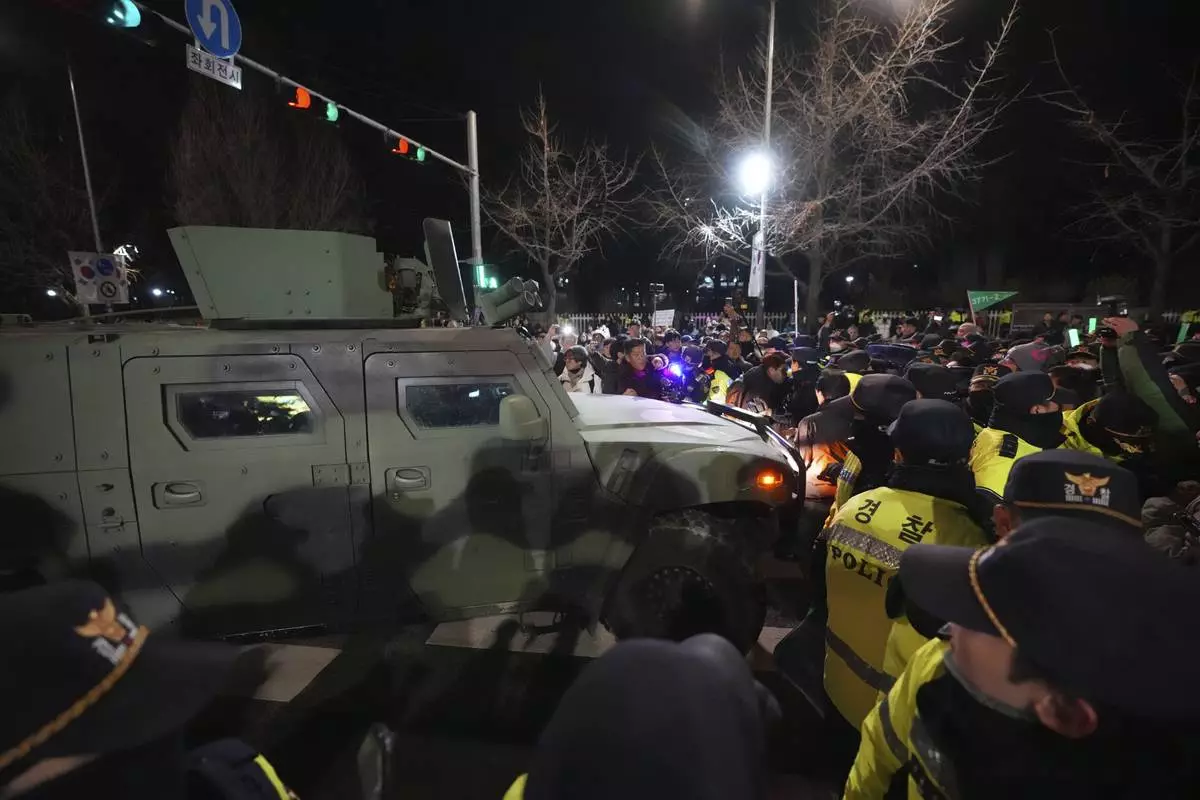
Military vehicle is escorted by police officers as people try to block outside of the National Assembly in Seoul, South Korea, Wednesday, Dec. 4, 2024. (AP Photo/Lee Jin-man)
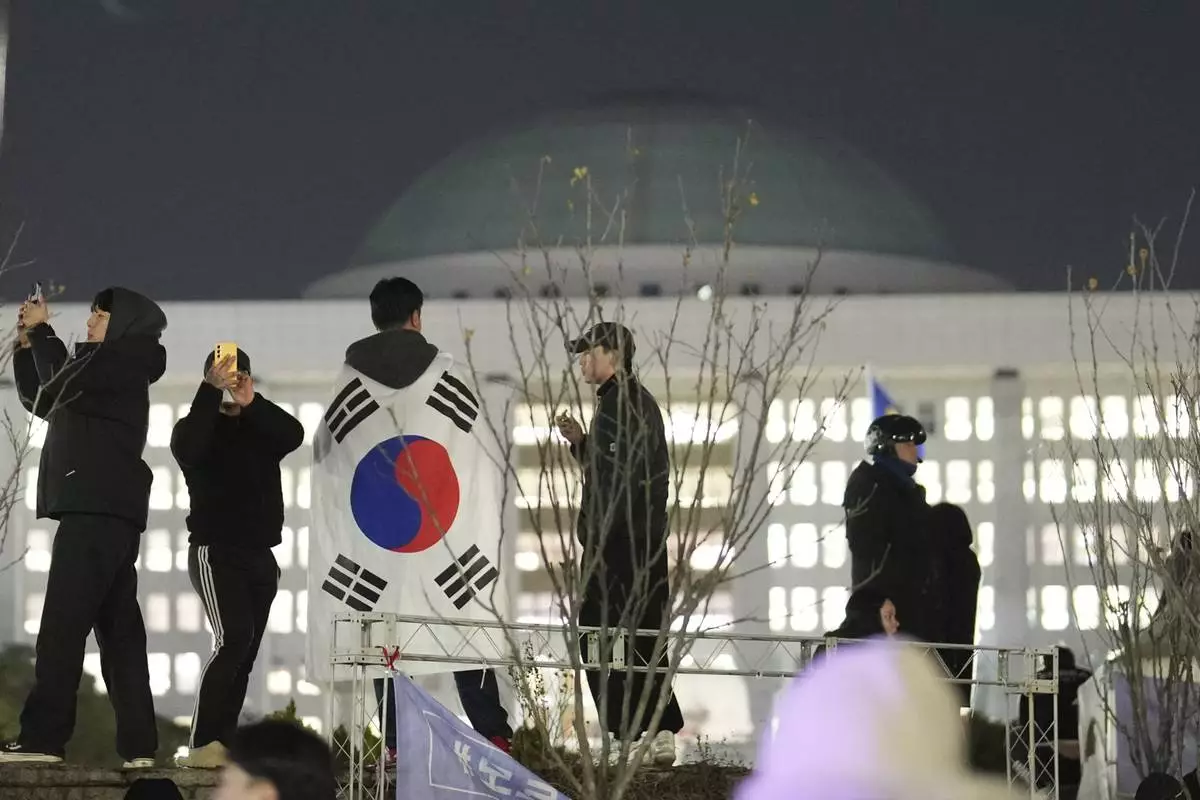
A man wearing a national flag stands on the wall of the National Assembly in Seoul, South Korea, Wednesday, Dec. 4, 2024. (AP Photo/Lee Jin-man)
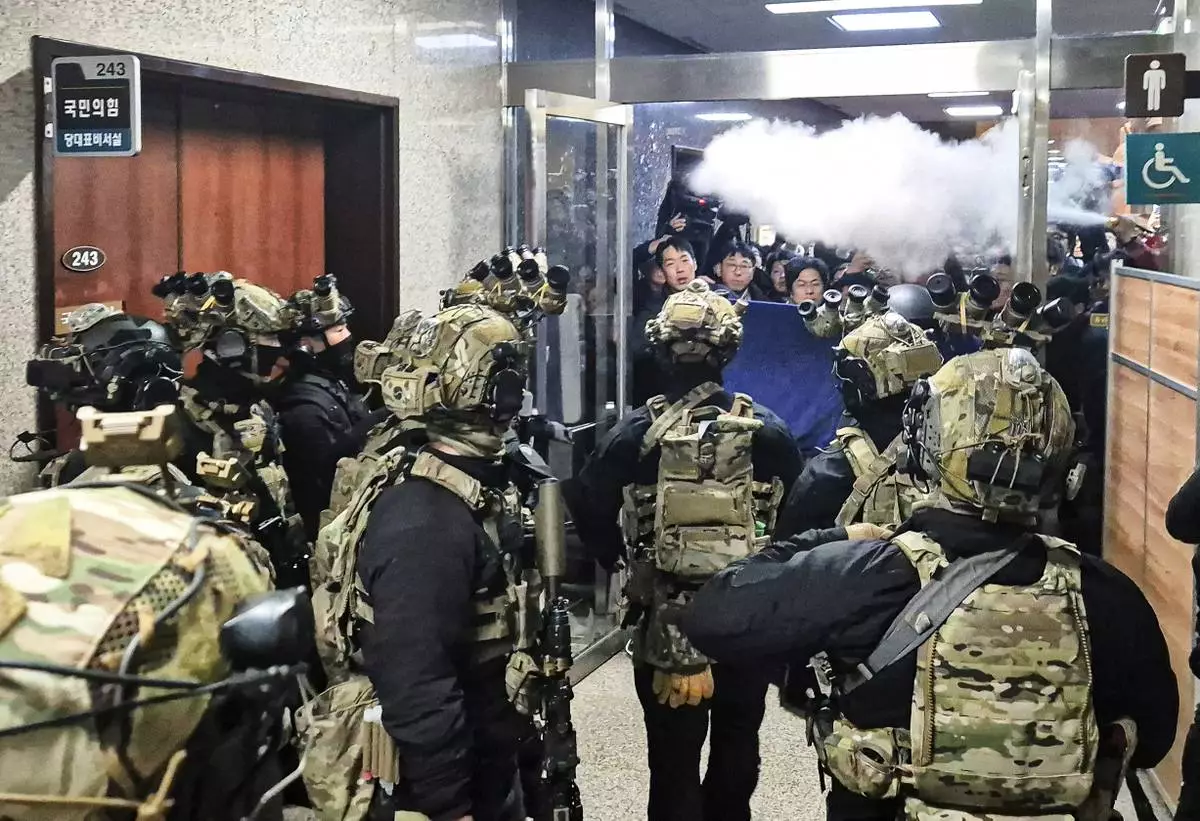
A National Assembly staff sprays fire extinguishers to block soldiers entering the main hall of the National Assembly in Seoul, South Korea, Wednesday, Dec. 4, 2024. (Jo Da-un/Yonhap via AP)
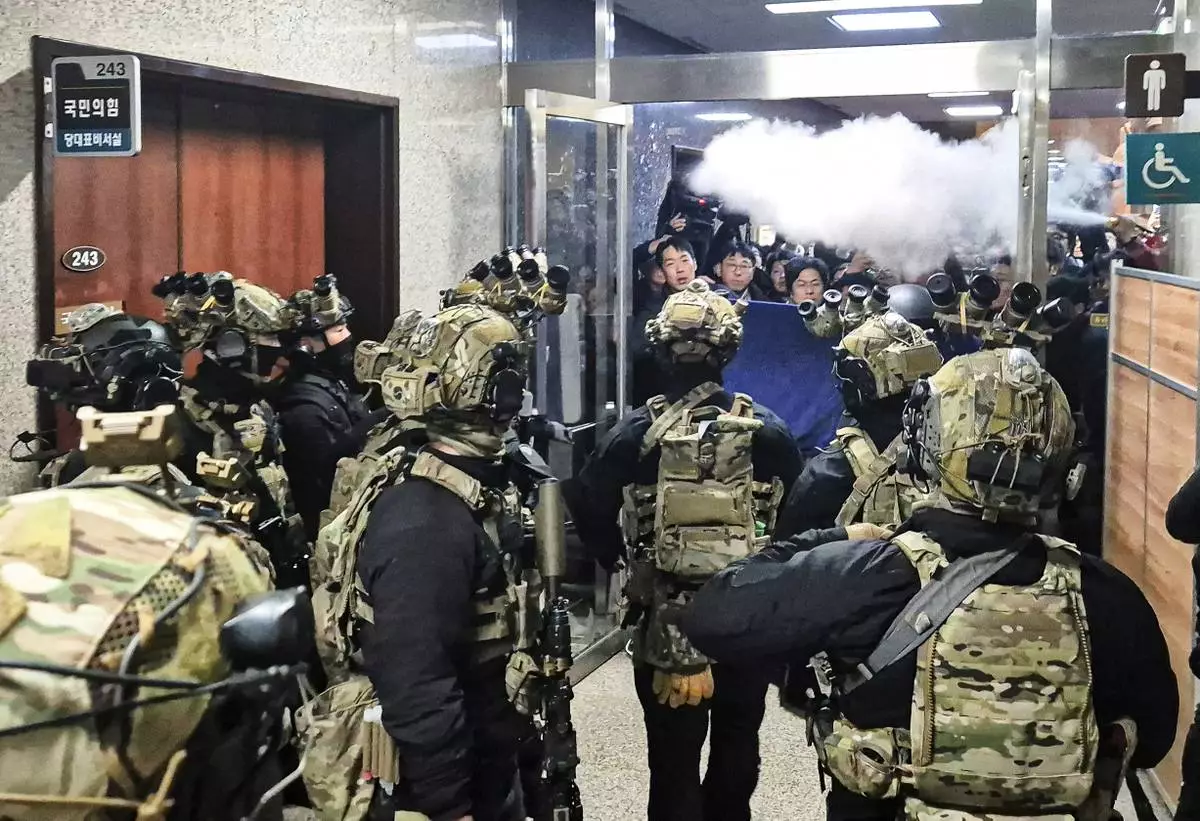
A National Assembly staff sprays fire extinguishers to block soldiers entering the main hall of the National Assembly in Seoul, South Korea, Wednesday, Dec. 4, 2024. (Jo Da-un/Yonhap via AP)
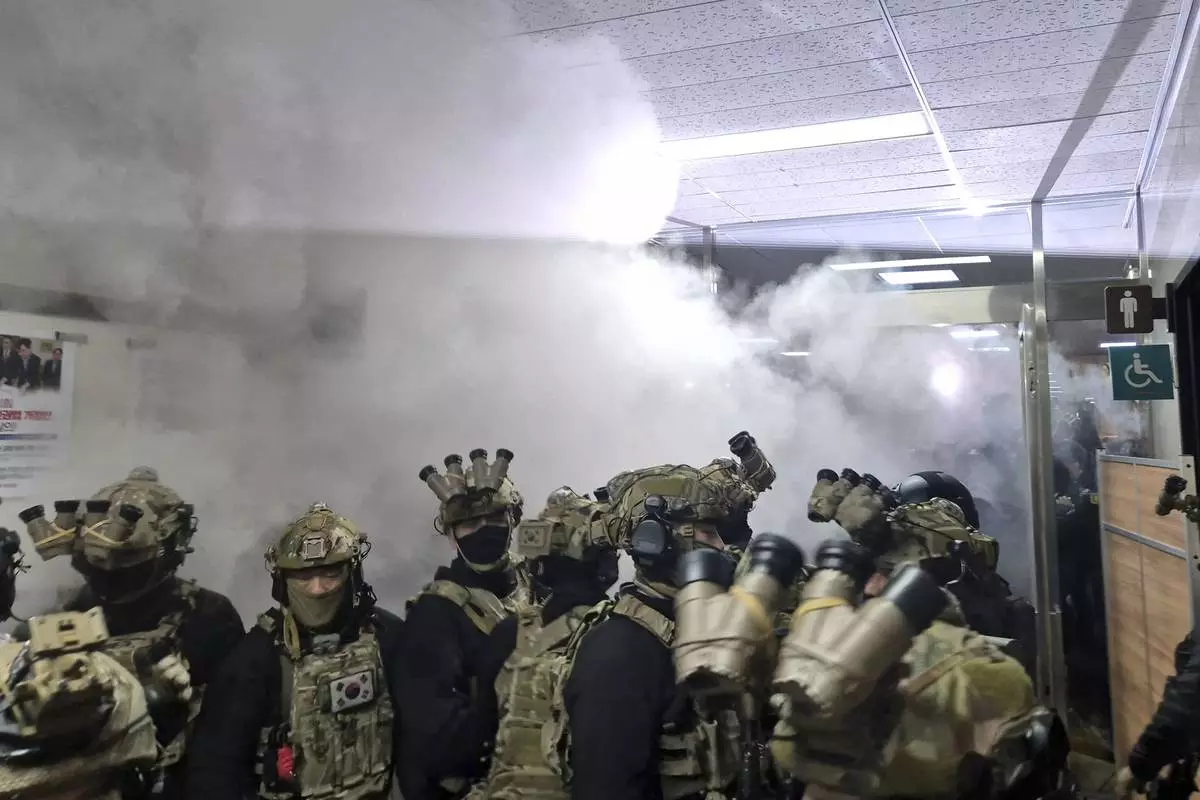
A National Assembly staff sprays fire extinguishers to block soldiers entering the main hall of the National Assembly in Seoul, South Korea, Wednesday, Dec. 4, 2024. (Jo Da-un/Yonhap via AP)
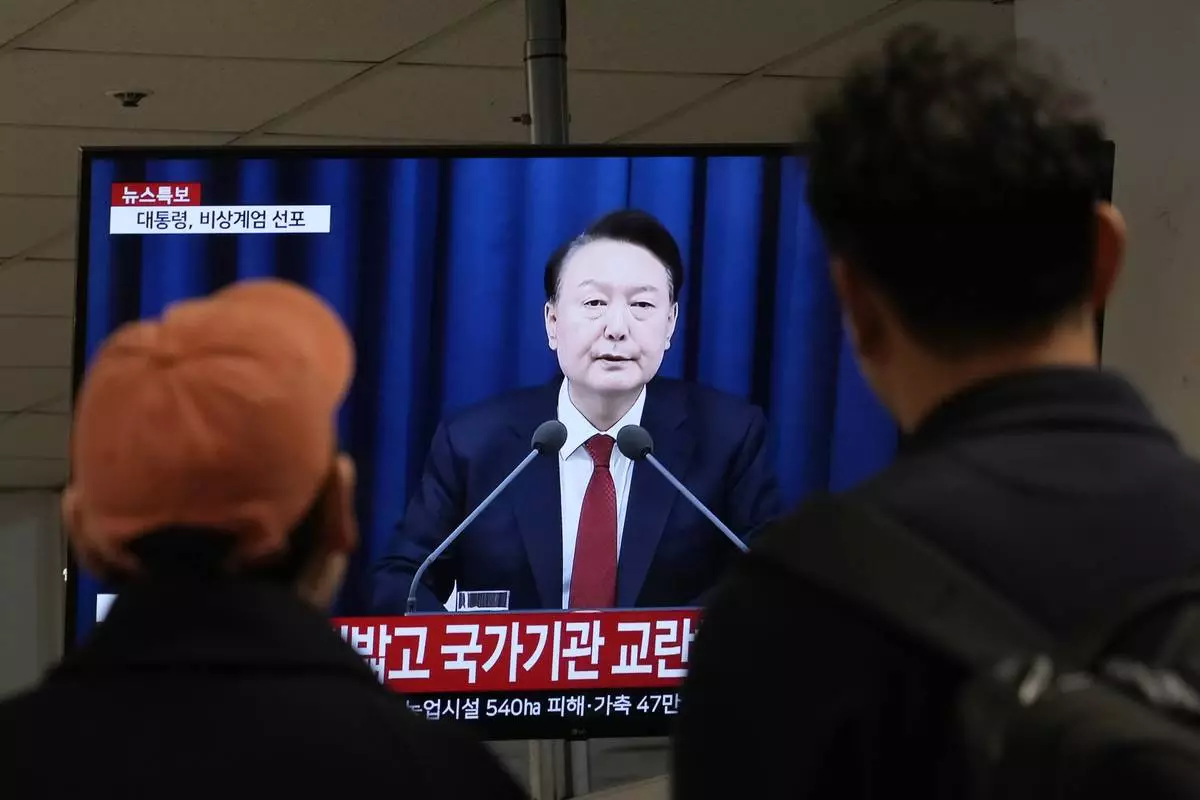
People watch a TV screen showing South Korean President Yoon Suk Yeol's televised briefing at a bus terminal in Seoul, South Korea, Tuesday, Dec. 3, 2024. (AP Photo/Ahn Young-joon)
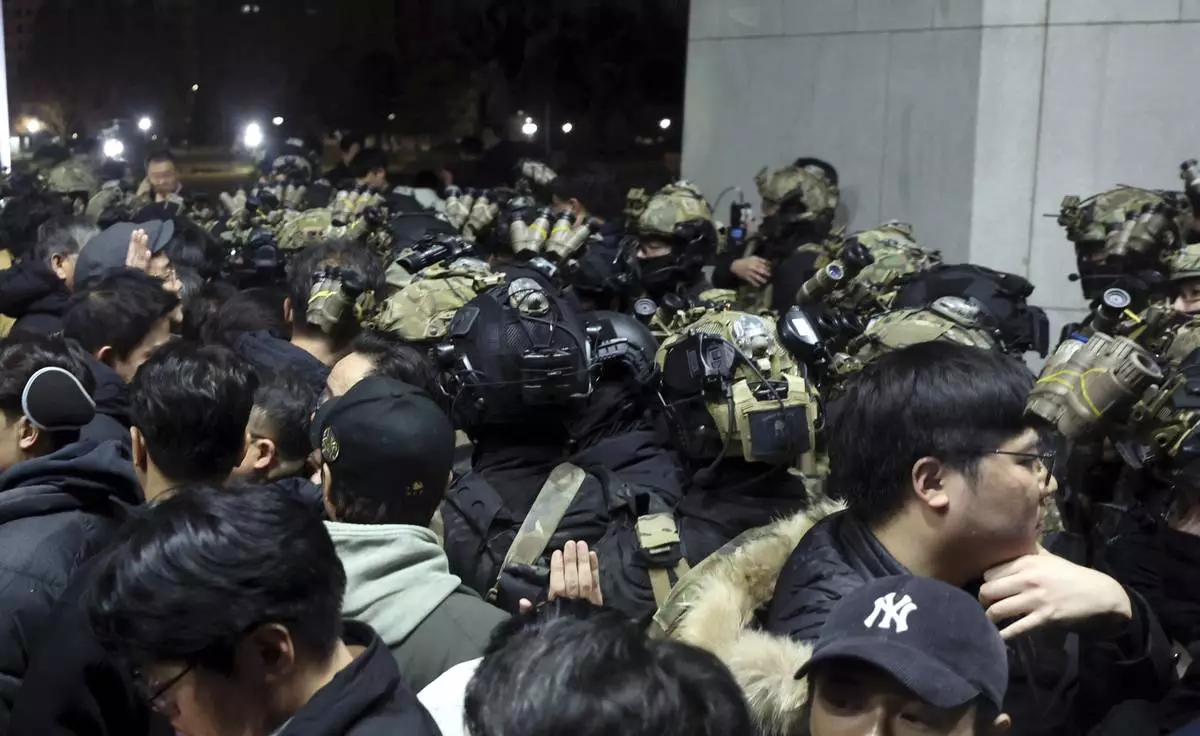
South Korean martial law soldiers try to enter the National Assembly compound in Seoul, South Korea, Wednesday, Dec. 4, 2024. (Cho Sung-bong/Newsis via AP)
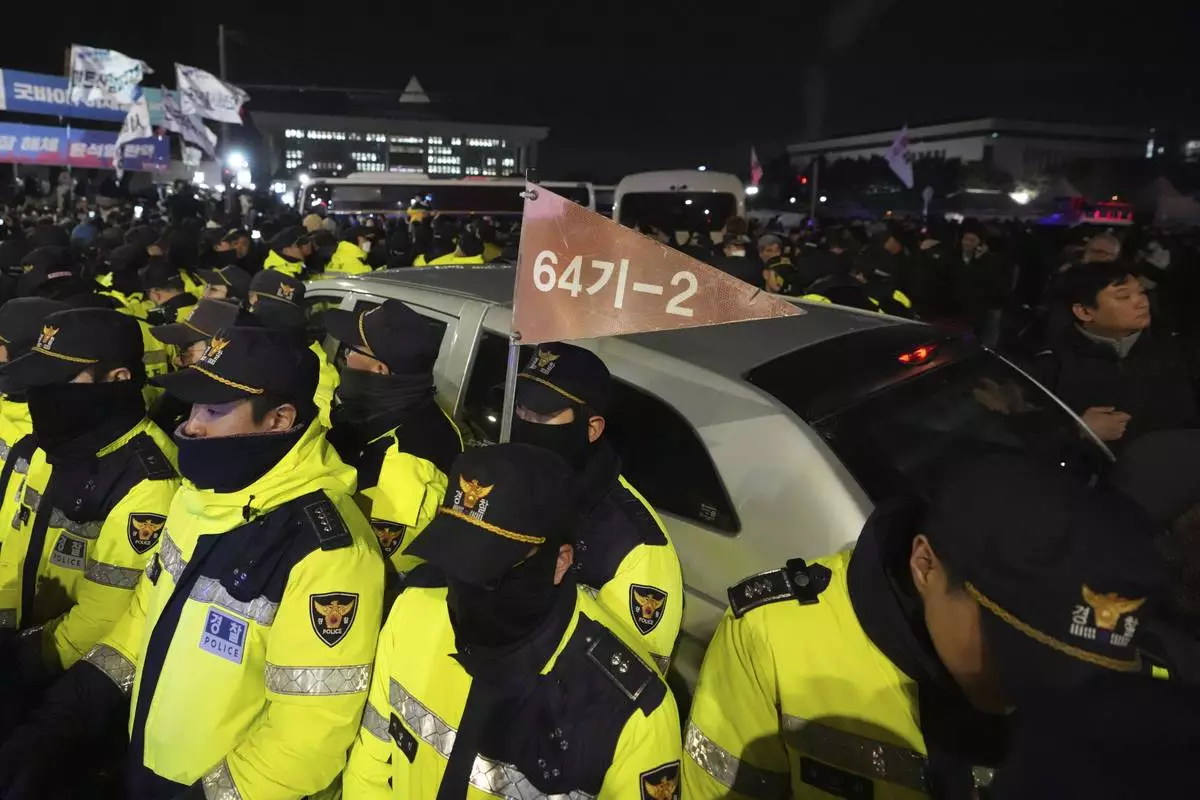
Police officers stand outside the National Assembly in Seoul, South Korea, Wednesday, Dec. 4, 2024. (AP Photo/Lee Jin-man)
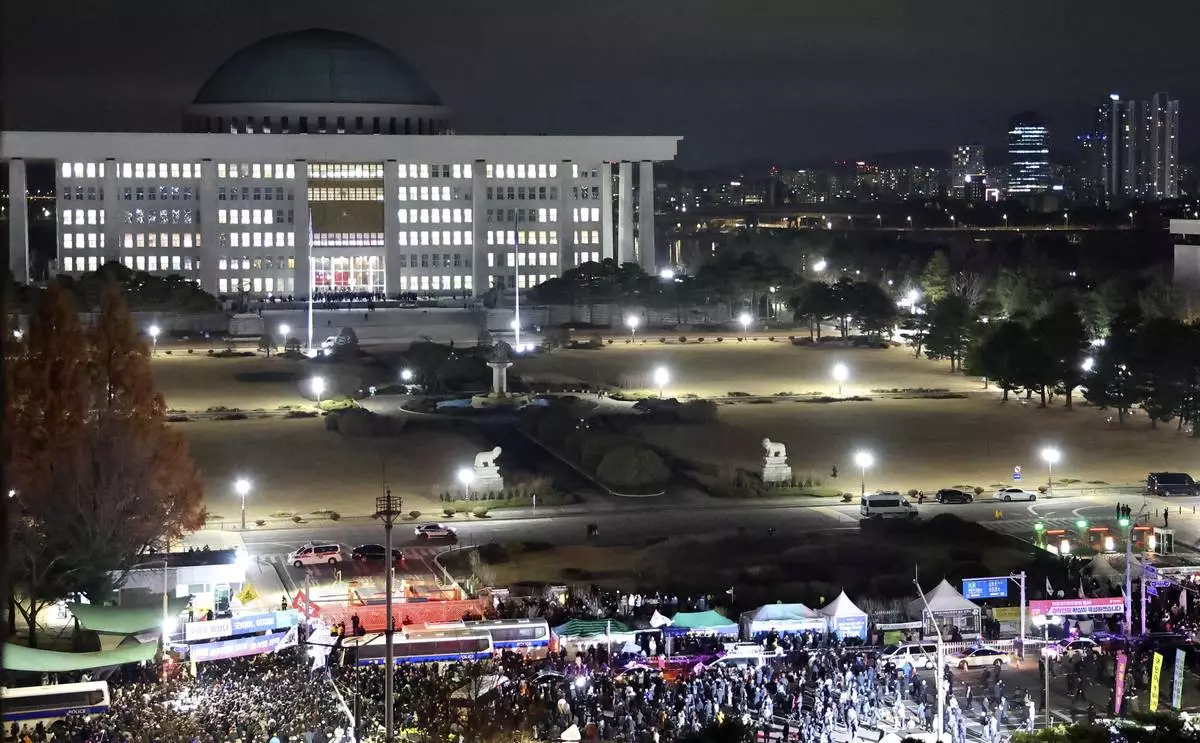
People gather to demand South Korean President Yoon Suk Yeol to step down in front of the National Assembly in Seoul, South Korea, Wednesday, Dec. 4, 2024. (Kim Do-hoon/Yonhap via AP)
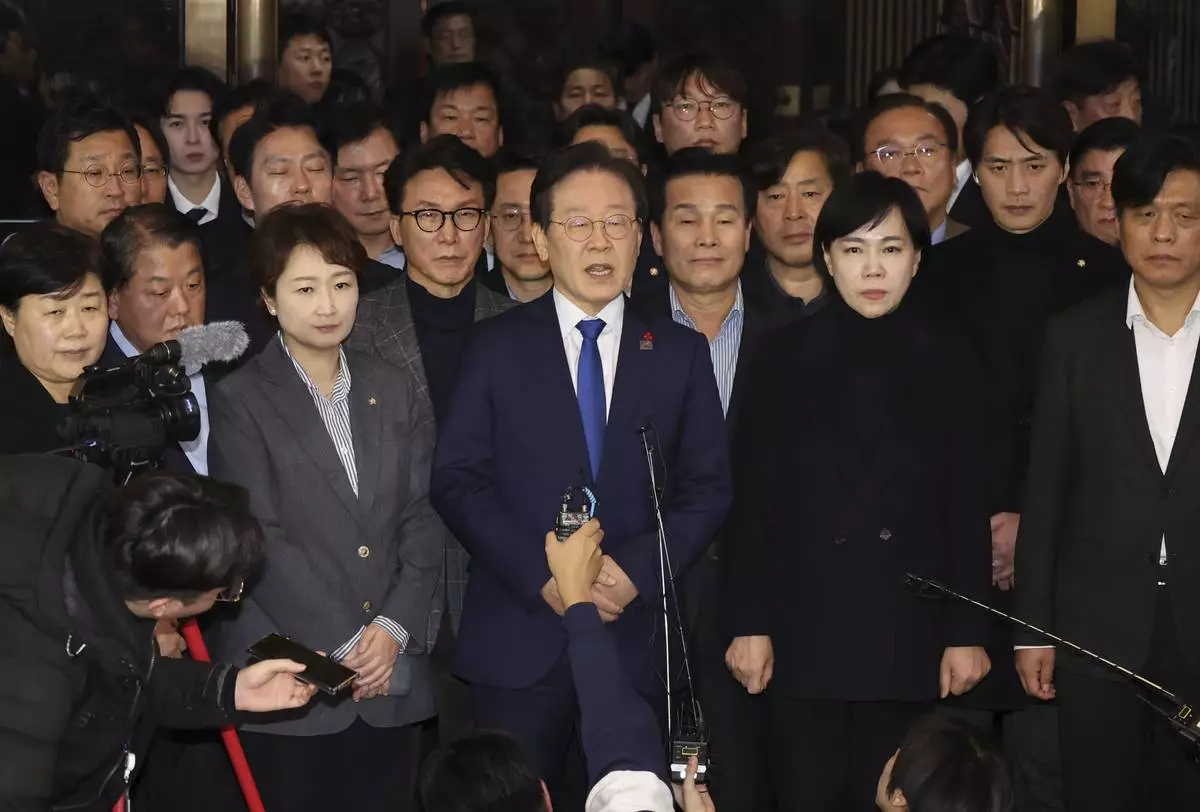
South Korea's main opposition Democratic Party leader Lee Jae-myung, center, speaks at the National Assembly in Seoul, South Korea, Wednesday, Dec. 4, 2024. (Kim Ju-hyung/Yonhap via AP)
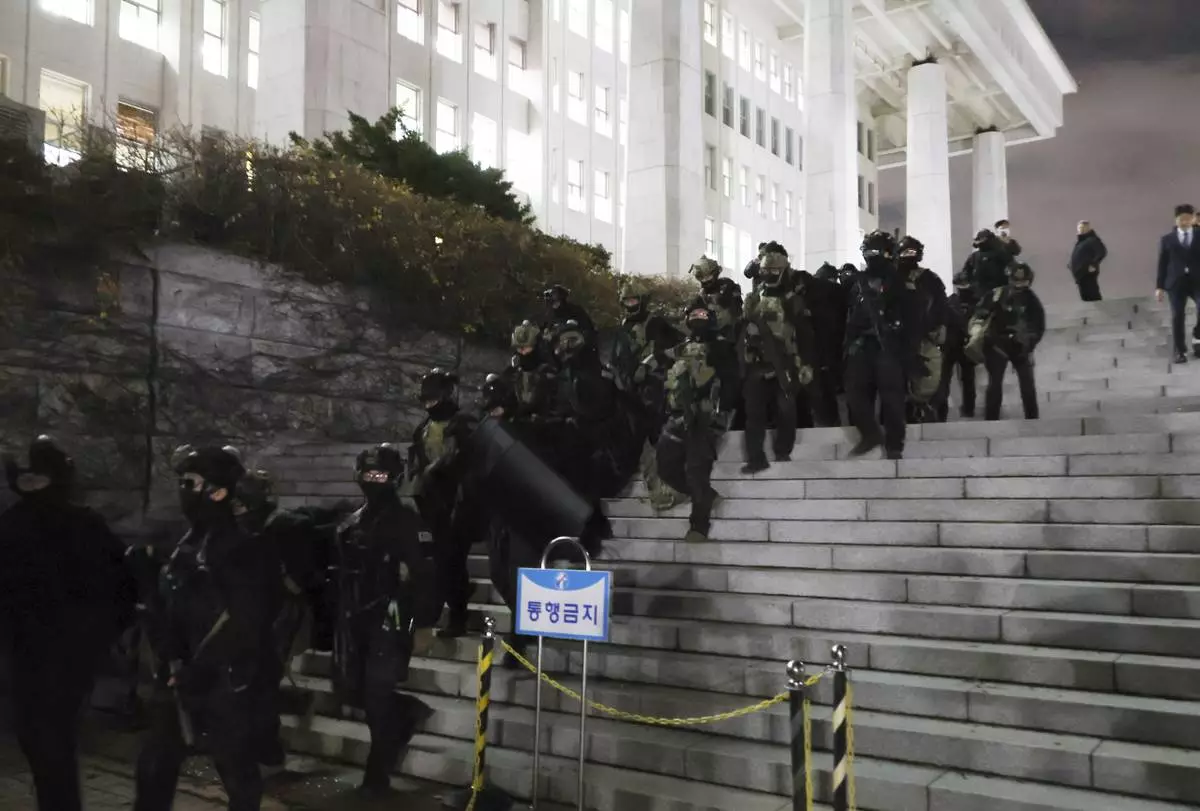
South Korean martial law soldiers leave the National Assembly in Seoul, South Korea, Wednesday, Dec. 4, 2024. (Kim Ju-sung/Yonhap via AP)
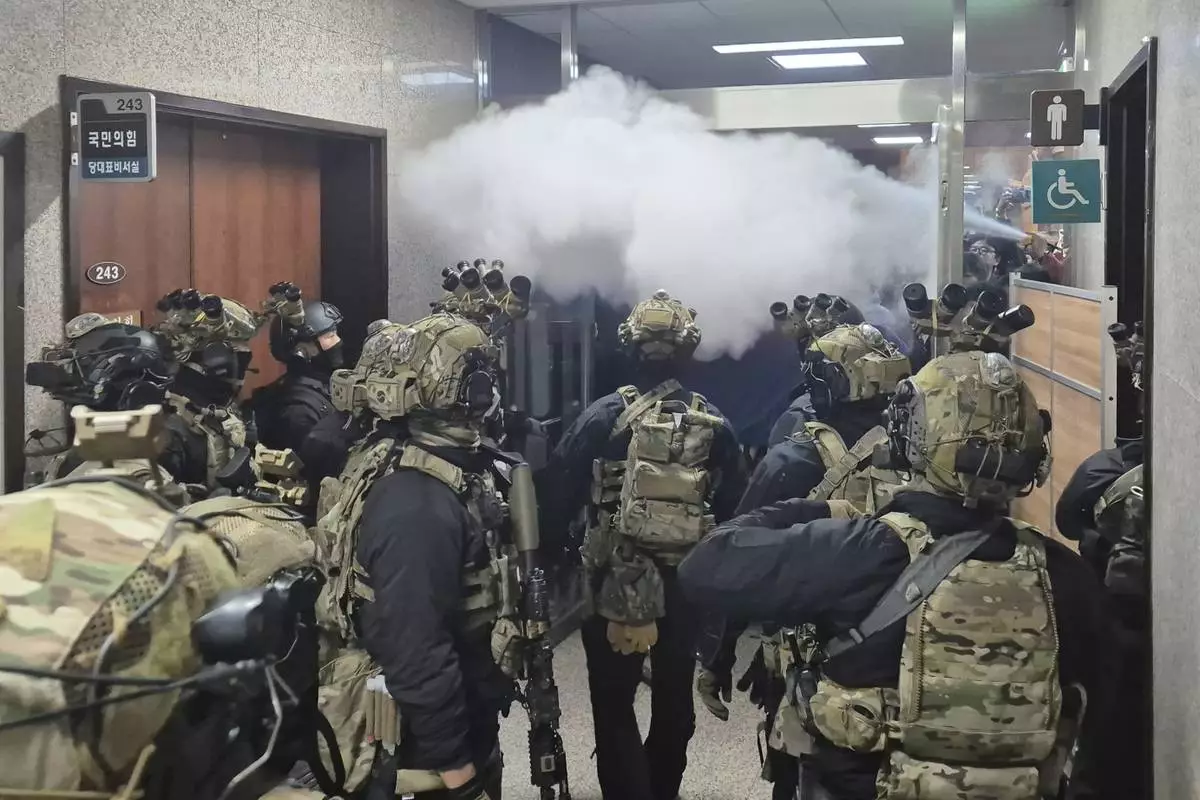
National Assembly employees spray a fire extinguisher towards soldiers at the National Assembly in Seoul, South Korea, Wednesday, Dec. 4, 2024. (Cho Da-un/Yonhap via AP)



